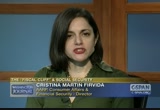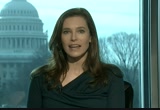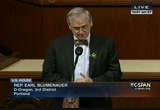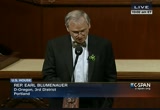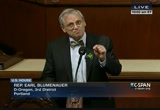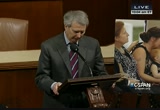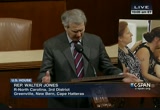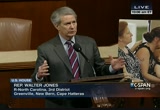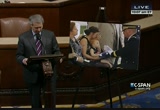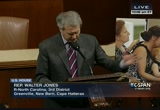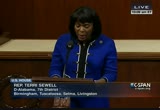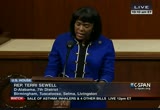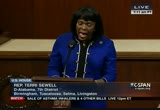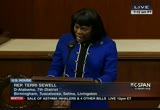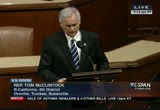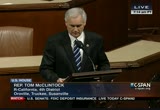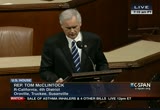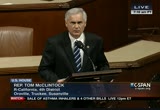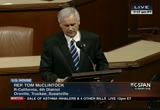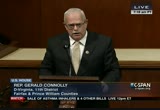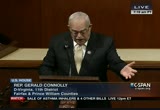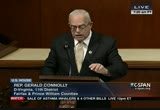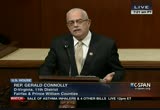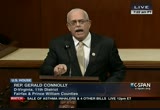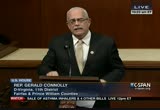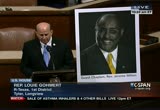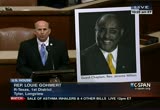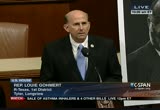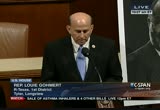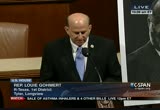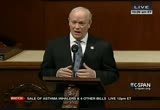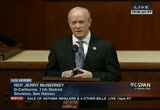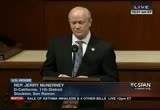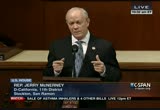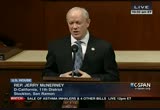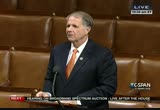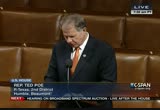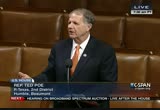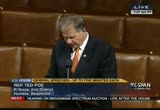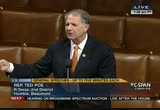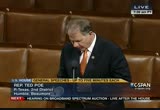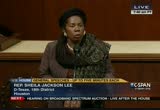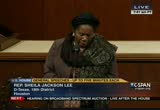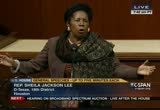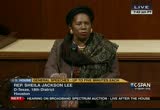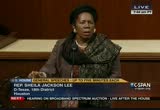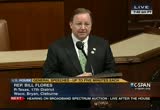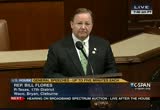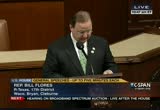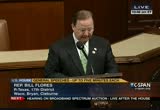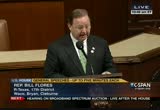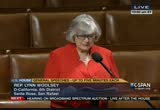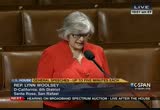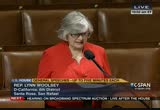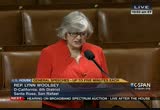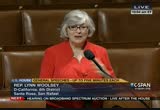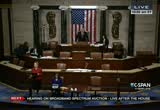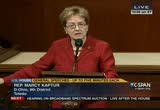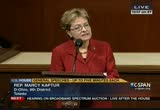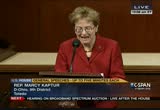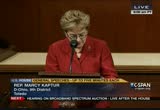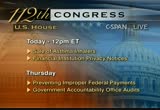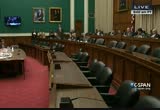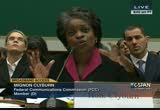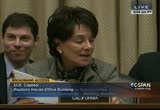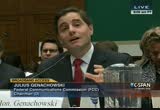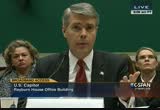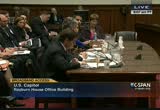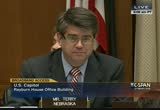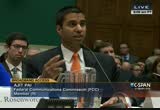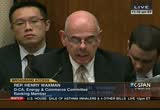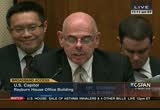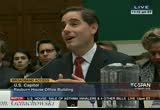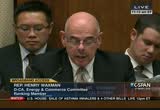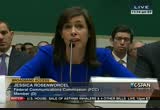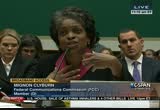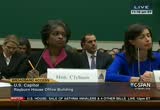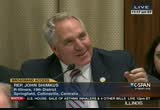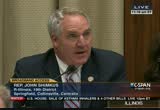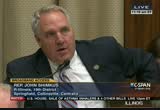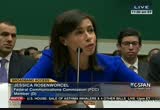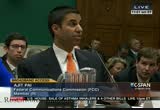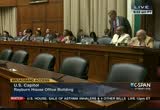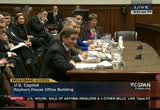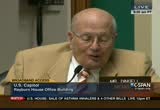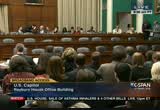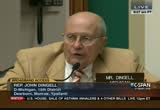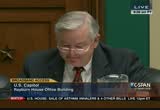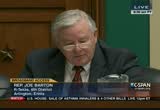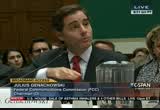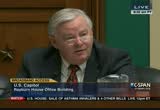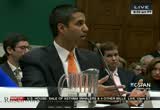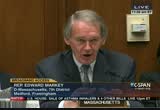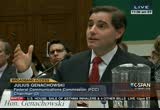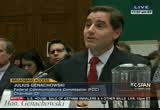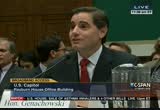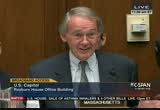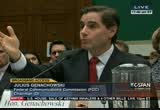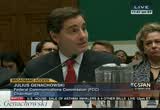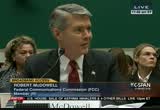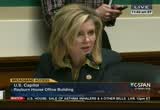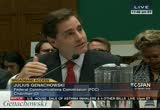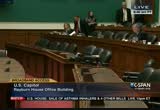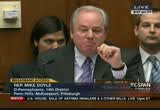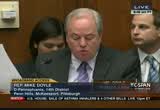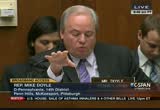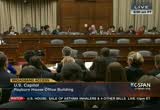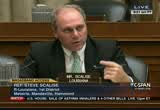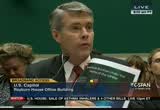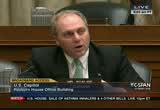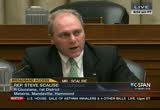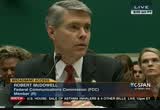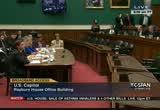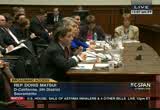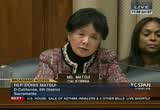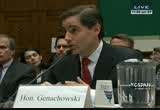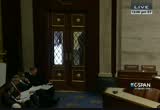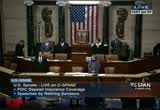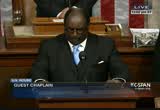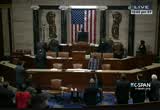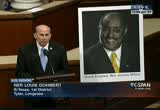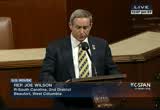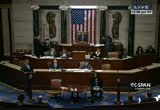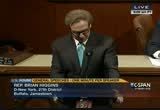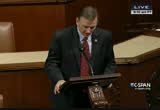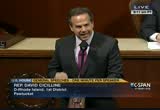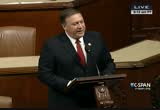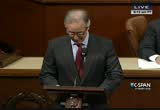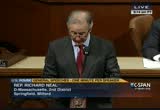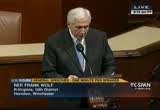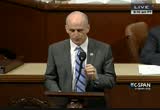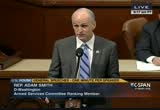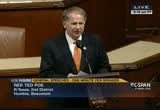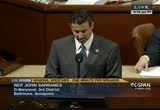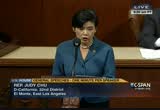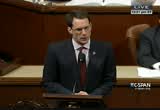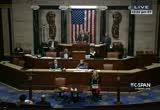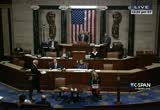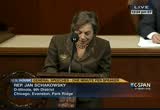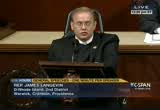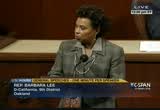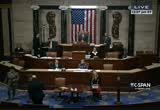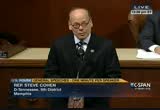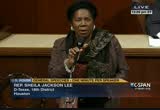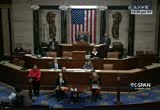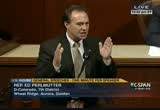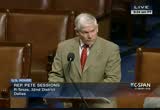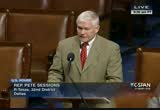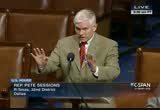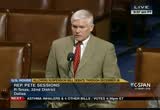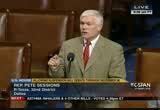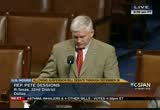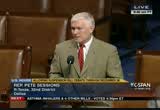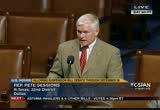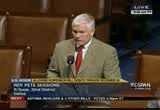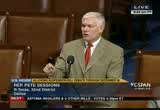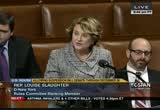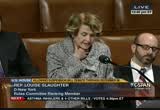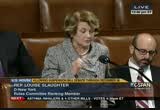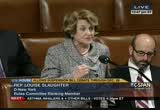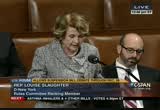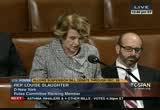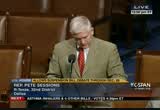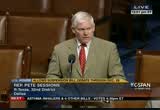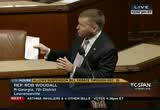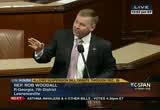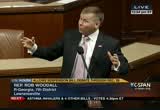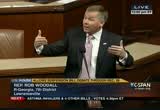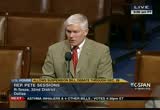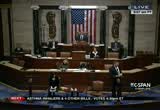tv Public Affairs CSPAN December 12, 2012 10:00am-1:00pm EST
10:00 am
is suggest there is a crisis. there is no imminent crisis in social security. we do have a funding gap. should address that. there is no imminent crisis in social security. it is regrettable that folks are concerned. his mother should not be concerned. it is unconscionable that we are worrying folks like your mom. it will be there for her. we need to think about the future of the program. host: cristina martin firvida, thank you so much. david john, thank you. [captioning performed by national captioning institute]
10:01 am
[captions copyright national cable satellite corp. 2012] speaker pro tempore on this day. signed, john a. boehner, speaker of the house of representatives. the speaker pro tempore: pursuant to the order of the house of january 17, 2012, the chair will now recognize members from lists submitted by the majority and minority leaders for morning hour debate . the chair will alternate recognition between the parties with each party limited to one hour and each member other than the majority and minority leaders and the minority whip limited to five minutes each, but in no event shall debate continue beyond 11:50 a.m. the chair recognizes the gentleman from oregon, mr. blumenauer, for five minutes. mr. blumenauer: thank you, mr. speaker. it's difficult to focus on the task at hand in the aftermath of a shooting rampage in my district yesterday. with at least 10,000 people in a shopping mall, a young man
10:02 am
allegedly and some eyewitnesses with body armor and semi-automatic weapon discharged 60 shots or more. there were two people killed and a young 15-year-old girl seriously wounded. mr. speaker, one is haunted by these events. we had one in aurora, colorado, at the theater where there was 12 people killed, 60 wounded. six people killed at the seek temple this summer. we had an horrific episode earlier in my congressional career in springfield, oregon. it's hard to have meaningful conversations in a variety of subjects. i was going to deal with that problem with the fiscal cliff today, but gun violence is
10:03 am
another area in america where it seems we can't have a discussion without delusional claims of overreach and taking away hunting rifles. congress won't even allow statistics on gun violence to be gathered, and we certainly have made no progress towards closing the gun show loophole. i come to the floor with a small array of hope. with nearly half of all military sue sides are committed with privately owned weapons, the pentagon and congress are moving towards establishing policies to separate at-risk service members from personal private weapons. congress is poised to enact legislation to end a prohibition about the military collecting information about firearms kept at home. these are simple commonsense
10:04 am
steps for an armed services where more military personnel take their own life than who die in battle. perhaps if we can take these reasonable steps to protect our servicemen and their families, perhaps we can have the courage to treat the epidemic of gun violence with the same thoughtful small steps when it comes to protecting the rest of our families. until then, we will mourn the victims and thank god that our families were not at that mall. thank you and i yield back. the speaker pro tempore: the chair recognizes the gentleman from north carolina, mr. jones, for five minutes. mr. jones: mr. speaker, thank you so much. in this very chaotic time for the house of representatives and for the american people, we need to remain focused on the fact that our young men and
10:05 am
women are still dying in afghanistan. our involvement in afghanistan has become a confused strategy at best. mr. speaker, i ask unanimous consent to submit a news article for the record. the title of this article is "afghan peace plan gives u.s. smaller role." with it, mr. speaker, i'd like to submit 1 names of american service people killed recently. the speaker pro tempore: without objection. mr. jones: mr. speaker, it's time for congress to listen to the american people and start acting on their wishes. poll after poll shows that they want to get out of afghanistan now. they want our troops home. they want to stop seeing our young men and women die. the american people want the $10 billion a month being spent in afghanistan to be spent here in america to help all our economic problems. i do not understand why we in congress seem to be without
10:06 am
debate about this problem in afghanistan. we are currently in the process of a bilateral security agreement that will keep our troops in afghanistan for 10 years after 2014. where is the outrage by congress? we're financially broke. we complain all the time about we can't reach it had deal or that deal. we are going over the cliff, and yet our troops are dying in afghanistan and we're spending money we don't have. mr. speaker, in the article, and i quote, the afghan government is pursuing a peace initiative in which pakistan would replace the united states in arranging talks between the warring sides and the taliban will be granted government posts that effectively see to them political control of the southern and eastern strongholds. mr. speaker, those areas are where we've lost most of our young men and women fighting the war in afghanistan, and yet we're going to give those areas that our young men and women
10:07 am
died to the taliban so they can control it. where is the outrage here in congress? i do not know. mr. speaker, in plain english, afghanistan is allowing pakistan and the taliban to control half the country. and while the taliban take back afghanistan, how does this make any sense? where is the outrage? the american people are outraged, mr. speaker, but not congress. mr. speaker, i have beside me a poster that tells pain. there's this little girl sitting in her mother's arms. the mother is crying. the little girl is so young she doesn't know why this army officer is presenting her mother a flag. she doesn't know that her daddy's been killed. she will one day. she'll ask her mom, what was my daddy like, and the mom will say he was a great man. he would love to see you now as
10:08 am
you've grown older. but he died in a country known as afghanistan, a country that will never change no matter how much blood, how much money is spevent in afghanistan. mr. speaker, before closing i have a website that if people would join and sign and the website is www.bringthemhome2013.com. it is time for this administration and congress to say enough has been done. it's time to bring our young men and women home. if pakistan is going to have more influence in afghanistan than america, then let pakistan send their soldiers to die in afghanistan. let pakistan pay the $10 billion a month that america's paying right now and has borrowed money from the chinese. mr. speaker, with that i will close by asking god to please bless our men and women in uniform, to please bless the child who died for freedom in
10:09 am
iraq and afghanistan. bless the house and senate that we will do what's right. i ask god to give strength, wisdom and courage to president obama that he will do what's right in the eyes of god. i ask god to please continue to bless america. i yield back. the speaker pro tempore: the chair recognizes the gentlelady from alabama, ms. sewell, for five minutes. ms. sewell: mr. speaker, i rise today to recognize and pay tribute to the life and legacy of an alabama state representative, dr. yvonne kennedy. a lawmaker from mobile, alabama, who passed away sadly on saturday at the age of 67. dr. kennedy was a pillar in the community and a tremendous public servant. she was the epitome of a servant's leader, and she blazed the trails in alabama politics that so many of us now follow. she led by example and was motivated by a drive and a passion for public service and education.
10:10 am
i am deeply saddened by her passing and know that her legacy of service will live on. yvonne kennedy was born on january 8, 1945, in mobile, alabama, to leroy and thelma kennedy. at a young age she displayed a commitment to academic excellence and upon graduating from high school earned her bachelors degree from alabama state university, a masters degree from morgan state university, and a ph.d. from the university of alabama. these early accomplishments were the beginning of an illustrious career, both as a lawmaker and a community leader. first elected to the alabama state house of representatives in a special election in 1979, dr. kennedy was one of the longest serving members of the alabama state legislature. she served the 97th district of mobile for more than 33 years. she was a prominent lawmaker who fought against alabama's
10:11 am
egregious voter i.d. laws and she championed the voter rights for rehabilitated ex-felons. she was the chair of alabama's black caucus and was well respected by her colleagues. her tireless commitment to public service and her advocacy for quality education in alabama was unparalleled. in 1981, dr. kennedy became the president of bishop state community college in mobile, alabama, and she served in that role for over 25 years. under her leadership, bishop state expanded from one campus to three campuses and flourished until her departure in 2007. dr. kennedy was a premiere educator whose commitment to education knew no bounds. dr. kennedy was a member of delta sigma theta sore record incorporated and was president from 1988 to 1992. she served on the board of association of higher
10:12 am
education, alabama's junior miss, a trustee for miles college and she was a longstanding member of the christian methodist episcopal church. she was youth director of the board of christian education southeastern alabama conference. now, i know that my generation owes dr. kennedy a debt of gratitude. i know that my generation stands on the shoulders of the trailblazers of dr. kennedy. i know her light guided me to become the first alabama african-american congresswoman. she left an imprint on alabama and across this nation and her legacy will live on. it is indeed a great privilege and honor that i have today to regular her legacy and contribution of dr. yvonne kennedy with this tribute on the floor of the house of representatives.
10:13 am
let her life stand as a testament to the courage and strength of one individual's ability to shape the lives of so many. on behalf of the seventh congressional district and the state of alabama and a grateful nation, i ask my colleagues to join me in honoring the life and legacy of dr. yvonne kennedy. the speaker pro tempore: the chair recognizes the gentleman from california, mr. mcclintock, for five minutes. mr. mcclintock: thank you, mr. speaker. to understand the federal budget mess and the so-called fiscal cliff, it's important to know three numbers. 39, 37 and 64. 39% is the combined growth of inflation in population over the last 10 years. 39%. 37% is the increase in revenues in the same period. that's despite the recession and the tax cuts. not quite keeping pace but pretty close. 64% is the number that is killing us.
10:14 am
64% is the increase in federal spending in that period. that's nearly twice the rate of inflation and population growth over the last 10 years. now, the spending side of the fiscal cliff is the so-called sequester, automatic cuts in federal spending. some say it's the end of western civilization as we know it. it's hardly the case. after a 64% increase in expenditures during this decade, the sequester doesn't actually cut spending at all. it simply limits spending growth next year to about half of a percent. now i opposed the budget deal that created the sequester last year because it fell woefully short of what standard & poor's clearly warned was necessary to help the a.a.a. credit rating. does our defense spending really need to be higher,
10:15 am
inflation adjusted, than it was at the height of the vietnam war when we faced down the soviet union and had 500,000 combat troops in the field? the sequester isn't stepping off a cliff. it is taking one step back from the cliff. now, the tax increases, however, are a very different matter. without intervention, the federal tax burden will balloon 1% at the stroke of -- 21% at the stroke of midnight on new year's eve, taking $2,000 to $3,000 from an averaged family. the house passed legislation to protect our nation from such a calamity but mr. obama vowed to veto it and the senate killed it. . instead mr. he obama tells us he'll veto any plan that stops taxes going up on all those very wealthy folks making over $200,000, who he says need to pay their fair share. i suppose fairness is in the eyes of the beholder.
10:16 am
the top 1% earned 17% of all income but pays 37% of all income taxes. but that's beside the point. the fine point of it is that a lot of these very wealthy folks making over $200,000 aren't very wealthy, and they aren't even folks. they are 1.3 million struggling small businesses filing under subchapter s. our small businesses produce 2/3 of the new jobs in our economy. so this battle is very much for the middle class. the congressional budget office estimates that mr. obama's tax increase on the so-called wealthy will actually throw 200,000 middle and working class families into unemployment. 00,000 -- 200,000 lost jobs. that is the optimistic estimate. an independent analysis puts that figure at close to 700,000
10:17 am
lost jobs. that's because the president's taxes would slam 84% of the net small business income in the country. that's precisely the income that is used to support and expand our labor force. in their blind pursuit of an eat the rich ideology, mr. obama and his acolytes are imposing a policy that would utterly devastate hundreds of thousands of middle class families who depend upon the jobs that these small businesses provide. and for what? to get enough money to fund mr. obama's spending spree for a grand total of eight days. it's telling that 3/4 of the new taxes he has proposed would be used to finance the new spending that he has also proposed. we republicans don't want to see taxes go up on anyone, period. we don't want to see this government willfully throw hundreds of thousands of americans out of work by this
10:18 am
policy. the president obviously believes that in the 11th hour republicans will have no choice but ultimately to protect as many taxpayers as we possibly can since the only alternative would be tax increases on everyone, including those job creators. he may be right, but that would mean a bleak and bitter new year for all of those families who watch helplessly as their jobs evaporate before their eyes. let us pray that this president has a change of heart before setting this calamity in motion. the speaker pro tempore: the chair recognizes the gentleman from virginia for five minutes, mr. donnelly. mr. connolly: mr. speaker, we just heard a terrible cry on behalf of the wealthy in the united states. that top 2%. tax them and it will kill jobs. put people out of work. if you want to know the real victims of sequestration, the
10:19 am
real victims of the republican fight to protect that 2% at all costs, it's the homeless, it's the poor, it's the lower income, it's the vulnerable amongst us. most of the debate up to now about the fiscal cliff has focused on defense cuts and expiring tax cuts. justifiable. but the ramifications for local safety nets are equally portentous. in my district, for example, fairfax county, recently kicked off its annual hypothermia prevention program. during my tenure on the county board i worked with faith, business, and community leaders to open houses of worship and other places to offer shelter from the cold and a hot meal for the homeless and individuals and families. it saves lives. last winter the program served more than 1,000 clients in one of the wealthiest districts in the united states. sequestration threatens support for this and other federal homeless prevention efforts. the mckinny-vento program
10:20 am
prevents homelessness would be cut by as much as $156 million. you didn't hear anything about that just now. and it would leave more than 145,000 more people out in the cold at risk of dying from hypothermia. similarly families in every state rely on low-income heating assistance which stands to lose as much as $270 million in sequestration. that may not seem like much, but that program's already been cut by the republicans by 30%. millions of americans every state rely on the support, including 145,000 in my home state of virginia. the picture gets even worse when you look at the looming cuts to federal housing assistance. programs like the federal community development block grants, section housing, rental assistance for the needy and senior citizens already has sustained dramatic cuts over the last two years under republican control. the home investment partnership program, which supports
10:21 am
homeownership and rental assistance, was cut more than $600 million, or 38%, last year alone. it faces another $82 million cut in sequestration. prim in my district was one -- prince william county in my district was one. cuts in federal housing support would further exacerbate the situation just as the local housing market is beginning to recover. there is an old proverb about someone always getting left out in the cold. but in this case people literally will be left out in the cold if we allow sequestration to go forward. mr. speaker, the cuts in housing assistance are just one piece of the local safety net. threatened by sequestration. i recently met with the disability community in my district and they, too, are anxious about losing vital support that allows disabled loved ones to live independently. one local organization, for example, is providing work opportunities and rehabilitative services to more than 650
10:22 am
disabled adults in our community. whether it's performing custodial services, packing medical kits for our troops, working in food services, or other duties, these workers are making a positive difference and providing autonomy for individuals in our community. i and many of my colleagues, here in the house, democrats and republicans, are ability champions, we know firsthand the positive effect of this program that has not only a positive effect on individuals but their families and their friends. pointed opportunities for the disabled and revenue from their work reached an all-time high last year, but that momentum is at risk because of looming cuts through sequestration. community service boards, for example, could lose as much as $52 million, reducing services for more than 1.5 million people in america. you heard my colleague talk about maybe a few hundred thousand jobs at risk if we cut taxes for the rich. what about these people? what about the real cuts and
10:23 am
real effects on real people in america? what has been troubling to the residents of my district is the fact that up to now the republican alternative to these cuts has been to shift even more of the burden, not less, on to the social safety net programs. the sequestration replacement bill pushed through by the house republicans cuts $261 billion from safety net programs. it eliminates social service block grants which support meals on wheels for 1.7 million seniors. where's the concern for that? and provides childcare assistance for low-income parents returning to work. that plan cut $36 billion in nutrition assistance for at-risk families. in my district, the demand for nutrition assistance has jumped 135% since the recession. and it's up 73% in the commonwealth of virginia during that same time period. mr. speaker, we cannot afford to turn our backs on these families. sequestration is a real threat. we need to have a compromise and
10:24 am
a deal now to help these families. i yield back. the speaker pro tempore: the chair recognizes the gentleman from texas, mr. gohmert, for five minutes. mr. gohmert: thank you, mr. speaker. today when the house opens for regular session, we will be led by visiting chaplain, reverend jerome r. milton. this extraordinary man is a friend and he is an inspiration to me. to borrow from the testimonial sermon of his, reverend milton, as a very small child, was left with his brother and sister in a run down california motel to die. the san diego county welfare department found them and placed them in a horrific orphannage called the oak crest or fannage where -- orphannage where abuse of all kinds were inflicted upon them. many of the children in such
10:25 am
terrible conditions committed suicide. which included his brother and sister. after the horrors of this orphannage, he was placed in 13 different foster homes where he suffered more unfathomable abuse and inhuman treatment. finally as jerome says, god heard the cry of the lam -- lamb, and he was placed in his 14th home of florence johnson brown, she could not read or write, but she was a good woman with a big heart and a stronger will. she took jerome and she said she could not imagine all the abuse he had been through. it just sounded too unbelievable. but she looked him in the eye and said, don't let your abuse be your excuse. she said someday you could be a
10:26 am
great juvenile judge or case worker, something special. but there was a lot of rebellion and anger in the young man. he hated lots of people and things, and especially god. ms. brown would not heed jerome's fleas to leave -- pleas to leave him alone. she kept praying for him every single day by name. she said she knew there was good in him but prayed that god would not let him end up in jail or prison because she knew god could do something very special with him. he tried the praying thing himself but he was cynical. he wanted to go to college, he wanted to be a coach, but he knew no one who had money. but then he found out he could run really fast and play football really well. though his teacher told him he was too black and too stupid to
10:27 am
ever amount to anything, he proved her wrong when just 4 1/2 years later he taught in a classroom right next to hers. as reverend milton says, god made him from foster care to people care. this angry black abused hopeless shell of a downtrodden young boy had god-given potential. this is what sadie brown saw in him. before she died she told jerome, all you can do for me is if you can do for a group of children what i have done for you, then my living will not have been in vain. she said, i don't have a million dollars, but i hope i made a million dollar difference. when she died, she had raised 44
10:28 am
children, giving hope to each one. jerome says she led him to jesus and jesus opened his heart. he providentially met and married charlie and together they have nine children. six of them were adopted through the foster care program. in tyler, texas, is where two heisman trophy winners grew up, but it's also the mission field of reverend jerome milton. and his wife, charlene. that's where they invested their lives. he's the senior pastor of the greater new pleasant hill baptist church in tyler, been there for 25 years. he established the sadie florence brown children's home for homeless mothers and abused children. he's the head track and field coach at bishop gorman catholic high school, for 24 years, leading his team to 10 state track and field championships and has helped 150 athletes earn scholarships.
10:29 am
he's also been the tyler citizen of the year winning the t.b. butler award. his work towards spanning race and religion and all types of barriers is balanced and listed accomplishments would take all day to read. he has blessed our town, our district, our state, and our country. it is an honor and inspiration to know him and count him as friend. i look forward so to having my friend as visiting chaplain today at noon eastern time when he opens the official part of this session in congress. god bless america and god bless jerome milton. thank you. the speaker pro tempore: the chair recognizes the gentleman from california, mr. mcnerney, for five minutes. mr. north carolina americany: -- mr. mcnerney: this morning i rise about two things i care passionately about. wind energy and veterans. i spent more than 20 years in the wind industry as a
10:30 am
technology development engineer. in those days we saw some spectacular failures and dramatic failures, but every year we put more into the technology development. little bit this year in the aerodynamics, gear box, foundation, every year a little incremental improvement in the control systems, field testing so we understood what was going on and the power electronics, and today we have an industry that is a spectacular industry. . the touchins produce power for five cents per kilowatt. it's been a successful business. the united states dominated that business because of consistent policies, consistent tax policies. we could rely on the policies being there year after year. investors came in, engineers came in. in the early 1980's those policies began to change and
10:31 am
the technology began to leave our country and we've seen -- i've seen in my career the incentives come and go over the years. i can tell you it's devastating to the industry. it takes years to develop the infrastructure to produce wind turbines. the barings are 20 feet in diameter. it takes expertise in order to get a project in. you need to get a power purchasing agreement. you need to get permits. you need to get investments and then you need to order products. the products have one or two-year lead time they are so large. we put a lot at risk and we will see 40,000 jobs lost when the expiring tax credits end this year. a lot of those jobs go to united states veterans, veterans of our armed services. i can tell you what, when soldiers are trained, they are trained on large equipment,
10:32 am
they are trained on big projects. they're well disciplined. they're reliable. they work in very adverse conditions, and that's exactly the kind of training you need to be a wind dustsmith and a wind turbine installer. there is one industry in particular, aerostream. they train wind turbine windsmiths and 80% are veterans and they get good jobs in this country. and when the production tax credit goes away, that removes the hope of many of our veterans. now, the veterans of our country were soldiers and sailors. they volunteered their time for our country. they put themselves in grave danger and they came home and found very bad employment situation. the wind turbine industry has been a tremendous opportunity for them, and it takes this hope away from our veterans as a travesty. eliminating those jobs for veterans is absolutely
10:33 am
unacceptable. now, the production tax credit itself is a very effective way to produce energy. you get paid for when you deliver energy in the production tax credit. in the early days, the credits went to investments and a lot of investments were not so good, but today the motive is to have a very reliable, a very productive set of equipment and that's what happens when the production fax credit is extended -- tax credit is extended. it creates jobs. it helps develop the manufacturing base in this country. and i can tell you, if you want to be a great country, you have to have a big manufacturing base of those things that are at risk of going overseas, our manufacturing base, our engineering expertise, jobs, investments. this will be a real loss for our country. it will hurt our veterans. and the last thing it will hurt is our climate.
10:34 am
there are those that don't believe in climate change, but i can tell you the evidence is overwhelming. whether it's biological systems migrating to higher elevations that at more northern latitudes, it's melting glaciers, whether it's hurricane sandy, event after event shows climate change is here. it's real. it's a threat. and we need to reduce our consumption of fossil fuels. wind energy is a tremendous opportunity for us to do that. so if we let the production tax credit expire, we're risking losing manufacturing, we're risking veterans out of work, we're risking climate change. this is something we can't afford as a nation. the production tax credit is a very good investment in america and our future, and our manufacturing base. i urge all of my colleagues to consider helping to extend the production tax credits for our nation for our future. i yield back. the speaker pro tempore: the chair recognizes the gentleman from texas, mr. poe, for five
10:35 am
minutes. mr. poe: thank you, mr. speaker. according to "the boston globe," chen wu was beaten, choked, punched and held at knifepoint by a chinese national, wong chen, and that was in 2006. her attacker was sent to prison in texas, supposedly never to be heard of again, or so she thought. four years later, wu was sitting along in her apartment when guess who shows up? the person who assaulted her to begin with, and chen came busting through her door. he reportedly said in a taunting voice, i bet you didn't expect to see me here. wu quickly called the police and chen fled the scene. two weeks later he returned to finish what he began four years ago, and chen beat ms. wu to death with a hammer, stabbed her to death, leaving her to die in her very own pool of
10:36 am
blood. mr. speaker, ms. wu's death didn't have to occur. this could have been prevented. chen should not have been back on the streets after serving time in prison, but he was and here's why. after he served the initial sentence for assaulting ms. wu, he was ordered legally deported back where he came from, back to china, but his home country, our good old buddies, the chinese, refused to take him back. they didn't want him, and so they stalled and stalled and stalled, and over those three years of chinese stalling and gave him the run-around, chen was eventually free and free to kill and kill he did. mr. speaker, this tragedy is not an isolated phenomena. flafflet, other americans have died as a result -- unfortunately, other americans have died as a result of a gaping hole in the immigration system. it's no secret that everybody
10:37 am
believes our immigration system is broken. fixing it down the road will be complex and complicated, but there's some things we can do about immigration right now to fix specific problems and here's one of these. currently, mr. speaker, thousands of criminal aliens are in our country, just like chen, that have committed a crime, gone to prison, our immigration worked to order them deported but their country won't take them back. they refuse to do so, so those countries stall and delay and eventually never take back their outlaws. so by law when the person serves the time in our prisons, we can't keep them indefinitely waiting on this country to take them back, and so they are eventually released. these countries know that and that's why they stall. many of those criminals now are running around in american streets looking for more crime
10:38 am
and up to malicious mischief. the blood of american victims are not only the hands of felons who commit these crimes from foreign countries, but they're also the fault of those countries that refuse to take back those criminal citizens. you know, the blood of ms. wu is on the hands of chinese citizen wong chen. it's also on the hands of chinese bureaucrats that won't take chen back. oh, mr. speaker, they may wear white gloves because they weren't the direct killer of ms. wu, but their delay allowed for that crime to be committed. and below those white gloves are the blood of this citizen who was killed in this country. and it's not just china that's committing these acts where they won't take back lawfully deported individuals. there are numerous countries. vietnam, jamaica, pakistan, and cuba are just a few. what should we do? well, mr. speaker, there's already a law to require that there be some sanctions against these countries that refuse to take back their lawfully
10:39 am
deported aliens, but the state department doesn't enforce the law. the state department says, well, we want to work diplomatically to get these people back. we don't want to require any sanctions, and so they talk and they talk and they talk and meanwhile more crimes are being committed by these people that should have been sent home while the state department should have sent them back. we need to get these people out of our country who have been lawfully deported and these countries need to take them back or there ought to be a consequence. i've introduced legged that removes the -- legislation that removes the uncertainty and requires the state department of to follow through with visa sanctions against the countries that won't take back their lawfully deported criminals. i repeat. those visa sanctions should be primarily against first diplomats who refuse to take back -- who are diplomats from these countries who don't take back these individuals. it's time to play a little bit
10:40 am
of diplomatic hardball with these nations. after all, americans are dying because these criminals are illegally on the streets and their nation doesn't insist on taking them back. it's time to make them the problem of their home country rather than continue to remain our problem. otherwise more americans are going to die. it's time to play a little hardball with these countries. and that's just the way it is. i yield back. the speaker pro tempore: the chair recognizes the gentlelady from texas, ms. jackson lee, for five minutes. ms. jackson lee: i thank the speaker. i know that america watches as we deliberate, and i'd like to use that terminology on facing the fiscal concerns of this nation. let me quickly remind my colleagues, mr. speaker, that america is on the upswing with increed manufacturing, more
10:41 am
consumer -- increased manufacturing, more consumer confidence. the economy is moving forward. the economy is moving up, and so i believe it should be pronounced here today that the reform of the entitlements based upon ship shod, reckless deliberations, or should i say actions, are a nonstarter. there is no way, mr. speaker, that we should raise the eligibility age for medicare, that we should not think carefully about how we approach the reform of medicaid and that we don't tell the american people that social security is solvent. so i would say move quickly to pass the middle-class tax cuts that will be for all of americans, 100%, up to $250,000, and let's think about moving into 2013, how we make this economy better by looking carefully about how we reform entitlements that are not handouts but they are earned.
10:42 am
i wanted to move to something else. offer my deepest sympathies for those who lost their lives in the oregon massacre again at the hands of a gun and a perpetrator that is now dead and to say i thank bob costa for having the courage to get on national tv and speak to those who are rabid sports fans and say it's time for some form of gun regulation. the tragedy that occurred with the nfl player and his girlfriend speaks volumes to the idea of individuals who don't need to have guns in their hands. this phenomenon that guns don't kill, people do, is a trite and redundant and a ridiculous statement. we understand that guns have to have someone at their -- at their trigger, but the idea is with no regulations about those who had previous offenses, no regulations dealing with those who've had mental health issues, no regulations for the
10:43 am
gun show loophole that you can go in and buy guns on top of guns, it is time to reflect and i think the sports committee could work with us to assure that america realizes there's nothing wrong withstanding up for gun regulation. let me offer sympathy to the brent and brown families to the nfl family and those concerned about athlete in pro ball, that we can find a way to intervene. there should be intervention on these indents of violence. let me close and speak well about the issue of millions of workers in the united states postal service. yes, government workers, public servants, who over the decades have make americans' lives easier. just yesterday we were speaking about another day of -- on monday i think it was, on online shopping. i have small businesses who always say the post office is the most efficient and the, if
10:44 am
you will, cheapest source of getting their business product where they need to be. it is a shame that we have not addressed the question of hardworking postal works, rural post offices that are prolific in my state of texas, rural post masters who say it will be the death of their community. let us stand the post office up. let us view it as a vital system. there are individuals who depend upon this massive postal system. it can be made efficient. it can be made better. we can protect the workers. do we want to give a christmas gift to hardworking postal workers who as they are known to go through rain or snow or sleet and give them a pink slip for no fault of their own? this is not the american way. we create jobs. we don't destroy jobs. it's time for us to stand up and be heard before the deadline that our postal workers who are always there, who are the ones that find the elderly and the sick in their
10:45 am
homes, because they know their route and they find those persons if they are in need, they are the good news people that come by to seniors and come by to disabled and come by to poor families. i want to see that we can work together, bring our postal workers here to make a difference and to reform the postal system to keep it alive. it is a vital source of work, but it is a vital service to the american people. with that, mr. speaker, i yield back my time. the speaker pro tempore: the chair recognizes the gentleman from texas, mr. flores, for five minutes. . mr. norest: thank you, mr. speaker. mr. speaker, this is the second consecutive year that i have had the privilege to congratulate a heisman he trophy winner from one of two universities in the 17th congressional district of texas. today i want to congratulate johnny manzell of texas a&m university in college station, texas, as the 2012 recipient of the 78th annual heisman memorial
10:46 am
trophy. on saturday, johnny football, as he is now known, wowed audiences across the nation with his steady poise and remarkable play making ability. as a freshman, he personifies the fighting texas aggie spirit and proves the impossible is never out of reach. leading the aggies in their inaugural season in the southeastern athletic conference, johnny threw for 3,419 yards and ran for 1,181 yards, and he garnered 34 touchdowns. he broke a multitude of a&m, s.e.c., and ncaa records along the way. johnny is the first freshman and only the fifth player to have at least 3,000 yards passing and 1,000 rushing yards in a season. he holds f.b.s. freshman records for both rushing yards by a quarterback and all purpose yards by an individual. he is the s.e.c. record holder in total yards in a season of
10:47 am
4,600 breaking the previous record in two fewer games than the prior record holder. he also achieved an s.e.c. record for total yards in a single game of 557 yards, only to break that record two weeks later with a 576-yard game. johnny has logged nine straight games of 300 or more yards and generated five or more touchdowns in six different games. he tied an 85-year-old a&m recordle with 19 rushing touchdowns in a season. by the way, he still has one more game to play this season. johnny has many firsts among the awards and alow cadse he's garnered in 2012. he was the first player in the history of the s.e.c. to win the freshman of the year and the player of the year in the same season. he is also the first freshman to win the national quarterback award, most notably, he's the first freshman in college football history to win the heisman memorial trophy.
10:48 am
awarded to the most outstanding player in college football each year. johnny not only shined off the field -- excuse me, on the field, but off it as well. academically he has successfully completed enough credit hours to be classified as a junior even though he's a redshirt freshman. when he first addressed the media at the end of the regular season, johnny remained humble and gave credit to his teammates, coaches, and aggie 12th man, which is the greatest tradition in all sports. when he addressed the nation after receiving the heisman trophy, he named his offensive line individually and honored the one-year anniversary of the passing of a beloved teammate. johnny knows where his talents and blessings come from and he gave glory to god most importantly. what makes this year so special is how johnny and the aggie football team excelled in their first year of playing in the s.e.c. not too many people from outside their locker room gave them a fighting chance in their inaugural s.e.c. season, but they believed in themselves.
10:49 am
i want to congratulate the texas a&m university and football coach kevin sumland on a terrific 10-2 season -- regular season. he and his coaching staff are doing extraordinary work down in aggie land. keep up the great work. as johnny said, leadership, respect, and putting others first are what being an aggie is all about. aggies all across the world stand together not only as fans but members of the team. i proudly echo johnny's words when he -- when i say to the 12th man, to texas a&m university, and the aggies everywhere, this honor is for you. as an aggie former student, i want to thank johnny for an incredible season and i look for more exciting seasons in the coming years. before i close, i ask all americans to pray for our country during these difficult times and for our brave military men and women and first responders who are protecting us at home and abroad. thank you, mr. speaker, for allowing me to address the house
10:50 am
today. god bless america. and merry christmas to all. i yield back. the speaker pro tempore: the chair recognizes the gentlelady from california, ms. woolsey, for five minutes. ms. woolsey: mr. speaker, throughout my career in public life and even before nothing has motivated me more than a desire to end wars and violent conflict. when i was a small girl, saying bedtime prayers or making a birthday wish blowing out the candles, i always asked for world peace. so no surprise that over a decade ago i opposed the iraq war before it even started. it was appalling that we would invade a nation that hadn't provoked us, had nothing to do with 9/11, and did not have weapons of mass destruction. it was a lonely fight at that time. but i didn't do it to be loved. it was a matter of principle.
10:51 am
barbara lee, maxine waters, and i formed the triad, woolsey-waters-lee to organize our opposition. we held forums. we developed and out of iraq caucus. we traveled around the country. and in january, 2005, i offered the first amendment here on the house floor calling for our troops to be brought home. some of my own party thought that it was a mistake. that we wouldn't get any votes or enough votes and that we would be embarrassed. well, i told them that even if i were the only one voting to bring our troops home, i would not be embarrassed. as it happened we got 128 bipartisan votes. that very first time. so you see, mr. speaker, when you lead, people follow. because of a handful of progressive leaders and
10:52 am
progressives in our country that were vocal and fearless, eventually public opinion turned. it turned against the iraq war, it turned towards peace. if we and other outspoken advocates hadn't ignored conventional wisdom and had pressed for peace and hadn't -- hadn't pressed for peace, the war in iraq could still be going on today. in april, mr. speaker, of 2004, i started speaking from this very spot on the house floor about my strong anti-iraq war conviction. eventually these speeches focused on afghanistan where we have now been waging war for more than 11 years, despite more than 2,000 americans dead and nearly $600 billion wasted. even though we are undermining our own interests and failing to bring security and stability to
10:53 am
afghanistan. over the last eight-plus years, i have spoken here, nearly every day that i could. to drive home what a moral disaster and strategic failure these wars have been. when constituents and others call or come up to me or write and thank me, i say, but we are still there. i don't deserve thanks until all of our troops are home. you know, mr. speaker, because you have been here for many of them, my speeches haven't just been about bringing our troops home, they have offered a new vision for global engagement. from here i have outlined my smart security platform which calls for development and diplomacy instead of invasions and occupations. civilian surges instead of military surges. smart security means helping
10:54 am
other nations educate their children, care for their sick, and strengthen their democratic institution. smart security says we can make america safe by building international good will, by empowering people with humanitarian assistance instead of sending troops or launching drone attacks. it's the right thing to do, it's the smart thing to do, and it costs pennies on the dollar compared to military force. so, mr. speaker, today i'm delivering that message for the 444th time and my final time on the house floor to speak on a five minute special order. this is the last of my special order speeches on war and peace and smart security. i'm retiring from congress at the end of this year and i believe part of my legacy will be that i worked diligently for peace and a safer world. so in closing, mr. speaker, i'd
10:55 am
like to acknowledge that sometimes i have been accused of wanting a perfect world, but i consider that a compliment. our founders strove for a more perfect union, why shouldn't we aim for a perfect world? you see, i'm perfectly and absolutely certain that if we don't work toward a perfect world, we won't ever come close to providing a safe, healthy, and secure world for our grandchildren and their grandchildren. so i thank you, mr. speaker. and i thank my wonderful staff who had helped me over the last 20 years to work for a perfect world which means peace, health, and security for all. i yield back. thank you all. the speaker pro tempore: the chair recognizes the gentlelady from ohio, ms. kaptur, for five minutes. ms. kaptur: thank you mr. speaker, very much.
10:56 am
mr. speaker, as a representative from ohio, a state that borders michigan, i rise to stand in solidarity with the workers of michigan. many ohioans i represent actually drive to work in michigan. and due to the highhanded actions of michigan's governor and its legislature, they actually railroaded legislation through michigan with no hearings to take away the rights of michigan workers to fund the collective bargaining process that results in living wage workers' contracts. the workers of michigan are fighting to maintain their rights to a fair day's wage, for a fair day's work. i support their rights and the rights of every american to organize and negotiate by contract for proper pay and benefits, regardless of which
10:57 am
state they live in. the rights of labor by contract are critical to growing our middle class as opposed to rights by happenchance that are always up for grabs where workers have no rights and live in fear of the future. michigan's republican ideologues passed so-called right to work legislation. let's be clear, the bill being pushed there should be called the right to work for less, and that's exactly what president obama called it. to quote bob king, the visionary president of the united auto workers of this country, i quote him, every right to work state has lower wages, lower benefits, less security for their workers, and more income inequality, and they have a shrinking middle class. the u.a.w. is right. if you happen to live and work
10:58 am
in a state that has a so-called right to work law on the books, you earn an average of $5,000 less a year than if you lived in a worker rights state. the bill signed last night in michigan strips labor organizations of their right to collect dues to cover the cost of negotiating a collective bargaining agreement. the michigan law is pure politics. no, it is more than that. it is old school, union busting technique, pure and simple. and in michigan and ohio, we know a lot about union busting. as the daughter of auto workers, i know the history of the hired goons who bludgeoned auto workers back in the 1930's at river rouge, as workers began to stand up for their human rights as they labored in the dungeons of the automotive production facilities at the time. i actually would like to challenge the governor of michigan to come with me and let's work on the line.
10:59 am
a month in one of those motion rerepresentive jobs that make and characterize modern automotive production. they are not easy jobs. i'd like him to install the windows on the right side of a vehicle as it moves down the line over and over and over and over and over and over again. let's see how much fun he'll have. a year ago we in ohio witnessed a similar effort to eliminate unions in ohio, right-wing legislators moved through legislation that would have ended collective bargaining as we know it in ohio for public sector workers. we are talking about firemen, firefighters, police, teachers. well, the people of ohio proudly rejected that union busting earlier this year. citizens organized a ballot initiative to restore worker rights in ohio. and they won.
11:00 am
it was called issue two. the people of ohio voted to overwhelmingly protect the rights of those who protect us. and who teach our children. while worker rights were protected in ohio, up north what was done in lansing intends to extend far beyond the borders of just michigan. it will impact workers who commute from my state of ohio and indiana. this is about more than just one state. in fact, this is a national issue. not a state rights issue at all. this union busting bill is the direct result of weak federal legislation and i'm talking about section 14-b of the taft-hartley act which weakened the rights of labor. . congress should overturn that part of the law and should recognize the labor rights of every american citizen. that is why i joined a number of my colleagues in introducing legislation, h.r. 2775, that would do just that.
11:01 am
we should not have individual states competing against each other in a race to the bottom. haven't we seen enough of that? we need to support and build the american middle class by creating good jobs, good-paying jobs and secure benefits through secure jobs. i stand with the workers of michigan and am proud to do so. thank you, mr. speaker. i yield back my remaining time. the speaker pro tempore: pursuant to clause 12-a of rule 1, the chair declares the house in recess until
11:02 am
is is he said that "indications are we'll be here after christmas. that briefing covered by c-span. it will be available shortly in our library. next up live to capitol hill as all five federal communication commissioners are up on the hill today testifying, updating congress on the f.c.c. broadband spectrum auction plan. they've been testifying for the last hour or so on the subcommittee on communications and technology. >> when i talk to my counterparts overseas they're very focused on the mobile. they are looking at the next generation of license.
11:03 am
if we don't run into this we run into risk. of course we'll operate within the confines of the statute which i know that both sides of the aisle were both carefully constructed. >> thank you. to commissioner clyburn, on the issue of bitter eligibility, do you believe that consumers would be harmed if the incentive auctions freed up the spectrum that was only acquired by the two largest wireless companies? >> i believe that the f.c.c. should keep in mind as we craft these rules what the -- one of the core missions of this agency is which is competition. and i believe and we should again craft these rules to ensure that the framework and the environment would promote such -- promote competition. it's good for innovation. it's good from the investment
11:04 am
and so it's got to be -- we've got to look at it in a broad framework and never forgetting our framework to stimulate competition. >> to the commissioner. it's wonderful to see you and hear your testimony. we've heard the suggestion today that auction rules that promote competition could result in lower auction revenues. but isn't it also true that allowing one or two firms to effectively shut out other competing bids could result in less revenue? >> i think that that is possibly true, but i think fundamentally we need to hold these auctions in a way where there are opportunities for everyone that will include incumbents and new entrants and we need to make sure that the revenues we raise are sufficient to support the first responder network authority. >> so two book ends, money and
11:05 am
competition. i yield back. >> the chair recognizes the gentleman from nebraska, mr. terry. >> thank you. we'll go with the chairman on this one. i believe the auction should happen as soon as possible but, of course, getting the rules correct. but broadcasters have expressed concern about the folks who will lose the signal if broadcast contours change from repacking. what is the commission doing to address this concern? number one, is there a further n.p.r. notice of proposed rulemaking that will delay the process too much? and is there an alternative approach to addressing this issue? >> well, in the statute congress addressed this issue and laid out guidelines that the commission has to follow in repacking. those issues were teed up in the noticed proposed rulemaking. we expect comments on that and be in position to make a decision.
11:06 am
meanwhile, we're engaging in direct dialogue through workshops and webinars in ways to go with broadcasters. and the ones that charmede walden mentioned that look at participating and those who aren't are focused on repacking. >> following up on the gentlelady from california's theme, i'm going to move to the commissioner's mcdowell and clyburn on this one. many argued that there should be no spectrum cap. do you think the current spectrum screen with the safe harbor of 1/3 of the spectrum is sufficient to protect consumers and create more competition? mcdowell first. >> i do and i expressed my concern when we launched our
11:07 am
spectrum aggregation about reverting back to the days of the hard spectrum cap. it might be under a different name or have a different way of approaching it. the spectrum is a lot like real estate, so you have to look at each transaction on its own unique case-by-case characteristics. and what were considered apples and oranges in terms of different frequencies a few years ago today is no longer the case. l.t.e. is being built out above two gig herts as well as one gigaherhz. and few years ago they were thought to be different. so i think we need to be very careful about where that proceeding could go. >> so -- >> one of the things that i keep in mind -- and i go back to the competitive landscape,
11:08 am
which is optimal for us and we need to keep that in front of our mind as we craft policies. also in terms of the aggregation currently, we have not looked at that proceeding. there has been no reform or adjustments since 2003. so i think the time is right for us to look at the policies and keep in mind what our goal is to have a competitive landscape and the benefits of that and so all of the -- have an open mind as it relates to that and i think that's healthy. >> so you think that the screen may not be conducive as much as you would like for competition and so we need to look at that again? >> a lot has changed since 2003 since that last review. >> and then our new commissioner, rosenworcel, what
11:09 am
would you think? >> it has a certain lack of clarity to it. at the same time technology evolves and we are finding that spectrum in the two gigaherhz is viable for broadband use. they may not respect the way that technology evolves. >> congressman, i agree with my colleagues that the time is right to revisit this framework in light of some of the defisheses i identified in this proposed rulemaking. notably, number one, our current approach understates competition in the market because it takes out certain spectrum that as my colleagues mcdowell and rosenworcel, the educatal broadband service. number two, our current
11:10 am
aproacht also creates uncertainty since parties examine how the commission is going to approach their spectrum holding. i think the time is right to revisit the screen. mindful of the fact we need to preserve what is right. in my current view, this current screen does a good job of that. >> the gentleman's time has expired. that were california, mr. waxman. >> thank you, mr. chairman. we had our differences on this committee and with the senate. then we finally reached a compromise. and we settled by agreeing to allow the f.c.c. to utilize guard bands that might have unlicensed and licensed uses to flourish. we understood this to be a good compromise that showed unlicensed and licensed uses do not have to be mutely ex-- mutually exclusive.
11:11 am
it is an unlawful giveaway. chairman genachowski, do you think we have to decide between the licensed or unlicensed model? is there an opportunity to create a band plan that includes both? >> no, i don't think we have to make that decision. yes, there is a decision to creates a balanced band plan that maximizes it for the country. >> some expressed concerned about guard bands that are too big or not technically reasonable. how will the f.c.c. determine the appropriate size? >> on the record, based on the engineering and input we get, we made a proposal based on the work that they did which we believe is technically reasonable. >> why do you think that startups, innovators, technology companies, many of which populate ms. eshoo's district and my district, care so much about unlicensed
11:12 am
spectrum? i heard from the cable industry that it is critical spectrum located in the television bands be made available for unlicensed use. >> because it's an extraordinary platform for innovation. it has been proven to be that. when it was first done 20, 30 years ago, now we know. and do we expand on this good idea or do we let other countries do it before us? the innovation will go to whichever country builds the most licensed and unlicensed infrastructure. >> and how do you explain the cable industry support what you're trying to do with regard to making sure that there is an unlicensed spectrum available? >> they have been innovating in the area, looking at unlicensed and using it to a vital alternative broadband access to consumers. innovation can come from tiny startups in silicon valley or larger companies.
11:13 am
we want to maximize all innovation. >> you gave a speech several months ago in which you suggested there was a war on wi-fi. what did you mean by that? >> well, i think i asked why anyone would want to launch a war on wi-fi and it's really one of the reasons we talked about. there has been such a productive beneficial policy innovation for the country. my view is that we should lean into it consistent with the statute. and anticipate that american innovators will take advantage of new platforms for innovation and invent things we can't even imagine now. >> i thank you for that clarification. this is an important provision. it was very important to people on this committee and the compromise i thought was a good one to allow this kind of innovation to be able to go forward. commissioner rosenworcel, how will the next generation 911 benefit americans and first
11:14 am
responders, and do you believe this is an important component of the f.c.c.'s public safety mission? >> yes. i think the first -- >> your mic. >> yes. i think the first duty of a public servant is the public safety. that's not just my opinion. it's the law. it's roit there in the first sentence of the communications act. next generation 911 is going to improve all of our safety. in the future we will have a world where every call into our 911 centers may be accompanied by video, photograph and your medical records. it can make us all safer. but the challenge is getting from here to there and that's going to take three things. first, it's going to take technical standards. the f.c.c.'s at work on that with our public safety colleagues. second, it's going to take a lot of coordination. the agency will need to work with the more than 6,000 public safety answering points around this country as well as carriers to produce that kind of outcome. and finally it's going to take
11:15 am
funding. to that end i would note that in the middle-class tax relief and job creation act, as a result of the work of this committee, there is up to $115 million in grant funds available for next generation 911. that's a terrific resource and it's my hope that the public safety answering points from around this country will benefit from that. >> thank you. and commissioner clyburn, if i could squeeze in a question to you. you have an been an advocate for the importance of competition as more americans, especially economically vulnerable populations rely exclusively on wireless service. do you believe consumers will benefit in the f.c.c. exercises authority to promote wireless competition in the upcome disturb upcoming incentive auction? >> there are more opportunities. you know, more options and that is good. especially for lower income consumers. it's not a one-size-fits-all --
11:16 am
i don't take a one-size-fits-all from the regulatory standpoint and i think i should promote that in the standing and framework. >> thank you, mr. chairman. >> the gentleman's time has expired. the chair recognizes the gentleman from illinois, mr. shimkus, for five minutes. mr. shimkus: thank you, mr. chairman, and welcome to the commissioners. first, let me mention how pleased i am we are working collaboratively with the text 911 issue. that's what kids use today. they move away quicker than we do. and the reports that i'm reading are true, then i like what's going on and that's what we hoped we would be working with regulators and the industry to resolve and identifiable need. kudos, congratulations and i would say keep it up. one is to have spectrum
11:17 am
available and two how to fund this. that's where this debate is going. and part of what anna said, it's keeping the new broadband spectrum law on track. and kind of like an oversight hearing and a lot of us are asking questions that pertain to that. i was appreciating this. when we talk about the guard bands, it just raises the historical aspect of light squared and for me i had great hopes that light squared would provide wi-fi to rural small town america. i like g.p.s. we all use it. but i think they cybersquated on spectrum that wasn't there. there was no band. there was nothing there to protect the spillover and we lost this great opportunity for rural america to have high speed internet access. and so i think that's part of this debate of how much is too
11:18 am
much, where is the band so we don't have encroachment but we also get full compensation. is that the debate we're having, you think, chairman? >> well, i think the discussion about how to get this exciting new opportunity right is the one we're having. the incentive action law was a landmark piece of legislation. it involved a lot of people and the obligation is now on us constituent with the statute to get the balance right and to do something that drives u.s. leadership in mobile, that raises substantial revenue for the treasury and provides investment and innovation and licensed. >> part of the legislation was to make sure we had the funds available to deploy. part of that debate was some people were saying, well, there's not enough money, we'll go back to congress and give us more. we are just not in that world
11:19 am
today. we're expecting it to come through this process. >> there's one piece here that i look forward to working with the committee on which is the channel 37 piece on this chart. i think we share your interest in freeing that up for option. as we looked at it in our notice process, we saw a much higher amount of actual use than we would like and the congressional authorization for the amount clear that spectrum at $300 million we believe at this stage won't be enough. this is an area where i do think we can work together on the bipartisan bay significance. perhaps clear channel 37, and i hope that's an area we can follow-up together, because that's a way to get more license spectrum up for auction and also move forward on unlicensed. look forward to working with you on that. >> that will be an interesting process because of the full deployment? -- deployment in that channel and what it does. it's like moving military
11:20 am
spectrum. >> that's why we haven't proposed auctioning it. and those aren't reversible decisions. >> let me end with a question to commissioner rosenworcel and commissioner pai. there's also been a large debate -- we've never really moved on -- on just restructuring, reorganizing the f.c.c. you're relatively new. having observed the process in the short amount of time you've been there, what are your thoughts about how we can really move the commission from the copper wire era to today? what would restructuring look? i have a minute left so if you could split that time that would be helpful. >> well, i think in part you're referring to the task force that the chairman just put in place which i think is a very good -- >> your ideas. i mean -- >> all right. so i will say that years ago we used to exist with a wire line, copper line into our houses. the networks we use today are
11:21 am
far more diverse. 1/3 of our households only have wireless phones. we have probably about 30,000 to 40,000 voip lines out there. >> how to reform the commission? we know that. how do we reform the commission? >> part of reforming the commission is under unsing the communication networks that are out there today and making sure that the commission's structure reflects those networks. and so we do have concerns about how we look at this as a matter of silos today where we treat cable differently than we treat traditional wireline architecture. and reflect the way we use networks today would be a good idea. >> chairman, 30 seconds for mr. pai for 30 seconds. >> i think there are two basic questions as we undergo the i.p. transition that we need to be mindful of. number one, what role if any should the economic regulation of the copper era have in the world of i.p.? in my view it should have
11:22 am
relatively little to the extent those types of regulations shouldn't -- you have conversions across different platforms. then there's the question of are there any social goals that we should all achieve in the i.p. world that is important? for example, if somebody calls 911, should it matter if they are calling on a land line, wireless or voip? it will be central challenges for the commission. that's part of the reason why i'm glad that the chairman announced the task force which i first called for in july. i think this really is the biggest challenge we face at the f.c.c. how do we approach the all-i.p. world? >> the gentleman's time has expired. we now recognize the chair emeritus of the committee, the honorable gentleman from michigan, mr. dingell, for five minutes. >> thank you, mr. chairman. my commodations for this hearings and we need to do what we're doing and i commend you for that. these questions will be yes or
11:23 am
no. first, chairman genachowski, mr. chairman, section 6403-b of the spectrum act, requires the commission to coordinate with canada and mexico when authorizing the reassignment and reallocation of broadcast frequencies. is that correct in >> yes. >> mr. chairman, i would note that similar such coordination took place for the d.t.v. transition and that it took a very long time. is that correct? >> yes. >> mr. chairman, will the commission commit to negotiating new arrangements for the state department, canada and mexico as mentioned in paragraph 34 of the commission's notice of proposed rulemaking before repacking broadcast frequencies, yes or no? >> i am not sure of that provision but we are looking forward to work with canada and mexico. >> yes or no?
11:24 am
>> i have to look at the provision. >> the law requires you to do it. >> we will comply with the law. >> i hope so. mr. chairman, section 6403-b-2 of the spectrum act requires the commission to, quote, make all reasonable efforts to preserve, of the day of enactment of this act, the coverage area and population served of each broadcast licensee as determined using the methodology described in o- et bulletin 69 of the office of engineering and technology. does the commission intend to define explicitly what such reasonable efforts will it constitute, yes or no? >> yes, it's part of our decision. >> mr. chairman, does the commission expect to have defined such reasonable efforts, yes or no? >> yes, it's part of our decision.
11:25 am
>> mr. chairman, paragraph 49 of the nprm states, quote, the allotment opt anyization model may have limited or not applicability to this proceeding. the commission states in paragraph 50 that, quote, it expects interested parties will have an opportunity for meaningful comment on all specific repacking methodologies. it is considering before it makes a decision, closed quote. does the commission publicly commit to sharing with the public the repacking methodology it adopts as well as the variables and other inputs it may use to predict repacking results? yes or no? >> yes. >> that's a big question. i had a hard time getting it out.
11:26 am
i'm sure you had your share of difficulty to it, mr. chairman. mr. chairman. i note the commission has had a proceeding pending on its pect rum screening since september of this year. does the commission intend to complete this proceeding before releasing rules for the voluntary incentive auction authorized by the spectrum act? yes or no? >> yes, that's our plan. >> mr. chairman, on a related note, does the commission intend to use its authority under section 309-j of the communications act to ensure broad participation in the voluntary incentive auction authorized by the spectrum act? yes or no? >> yes. >> mr. chairman, the commission released a technical paper by the staff in 2010 which
11:27 am
concludes additional 275 megahertz of licensed spectrum will need to be cleared in order to meet rising consumer demand for mobile broadband. does the commission believe that it can achieve that goal? yes or no? >> yes. >> mr. chairman, other than incentive auctions, how does the committee intend to meet that goal? >> well, by freeing up spectrum through removing regulatory barriers like we did just yesterday and also a few weeks ago with w.c.s. by recovering more spectrum through the government through spectrum sharing approaches, through cleaningering clo and reallocating government spectrum and through unlicensed spectrum. >> mr. chairman, thank you. we in the border states are very much concerned about what
11:28 am
could or will happen to us in this process, losing service, seeing stations go dark, seeing additional confusion and conflict with our neighbors to the north and south. i hope you'll keep that in mind as you go forward. mr. chairman, i ask your kindness in just one thing and that is to commend commissioner clyburn for her work on prison calling petitions before the commission. i appreciate the progress the commission has made on these petitions and encourage the commission to resolve these matters as expeditiously as possible. mr. chairman, members of the commission, thank you for your courtesy to the committee today. >> thank you, mr. dingell. mr. barton. you're recognized. >> thank you, mr. chairman. i'm tempted to yield back to mr. dingell to let him continue asking his yes or no questions. sooner or later he'll get to the one they can't answer.
11:29 am
chairman dingell did ask a question that i'm going to put a little bit different slant on. he referred to that part of the h.r. 3630, the new law, that the commission in making these reassignment or reallocations shall make every effort, every reasonable effort to preserve the existing population and coverage area for each broadcast licensee. over on the next page on page 72, subparagraph 5, with regard to low power television usage it says nothing in the subsection shall be construed to alter the spectrum usage rights of low power television stations. yet mountain f.c.c. powerpoint presentation in response to the question, can low power television participate in reverse action, the answer to that is no.
11:30 am
i understand that part of it. it says low power television services have only secondary interference protection and must make way for full power and class a tv stations assigned to new channels. i understand that. but then they don't go on to say that they have to promote -- they may be required to go to a different technology mvpd systems and/or the internet. i can't speak for the entire committee or the subcommittee but i can speak for myself who has been a member of the subcommittee and who supported the enactment. i didn't envision that we would have the end result that a low power television station would simply end up off the air. and so i would like to ask the chairman and the other commissioners if in fact you're
11:31 am
willing to commit that low power television stations that have acted in good faith, they understand that they may have to move or be repacked but i personally believe it's not fair at all that the end result is that a low power television station that's been a good licensee ends up totally off the air. >> well, these are questions that we asked in our notice. congress did not change the status of the low power stations and so they remain secondary services. many, as you point out, provide valuable programming in our communities. job is the hard one, how do we maximize the spectrum that we generate revenue for the treshy and also address the issues we're raising which is stations around the country that is providing low power television
11:32 am
stations. >> can we agree -- and again, the low power television stations understand that they're secondary. they understand under current law that they provide service only if it doesn't interfere. as the full power stations and the class a stations operate, they have to work around them. they understand that they don't have the right to participate in this auction. the one thing they are not willing to agree to is that they can be just kicked out of business, kicked off the air and that's that. can we agree as a committee and as a commission there we're going to take steps to make sure that if a low power station has operated in good faith and complied with the existing license that we will make an effort to keep them on the air? not necessarily in the same channel, but at least in the same market? have we will work with the lpd
11:33 am
community. we needed to act within the statute. keeping them on the air is something that makes sense. but i think at this point we haven't made a proposal on this. we had an obligation to listen to the record, act consistent with the statute and continue to work with you and members in the community to ultimately reach the goals of the statute. some of which are in competition with each other. >> let me ask the news commissioner, mr. pai, do you believe that the current reverse auction, forward auction, simultaneous system that's been out there -- outlined is really workable? >> it is certainly a novel construction which is necessary since the entire incentive auction presents questions. the pictures impression is congresswoman eshoo pointed out in her opening statement. i think the auction has an
11:34 am
advantage of certainty in real time as to what spectrum will be available. but there are obvious some complications. participants in the reverse auction aren't necessarily well versed in auction processes and they might not know exactly what the nature of the auction is going to hold for them. on the forward side, they might mott know which spectrum they're bidding on which hinders their ability. there might be challenges there. i am anticipate hopeful that they'll give them a wide range of perspective which will understand what simultaneous approach is the best one. >> i encourage the staff and members of this committee to keep an open mind on this because we have conflicting depoles. we want to maximize revenues for deficit reduction. we want to reallocate it for spectrum uses and those that
11:35 am
don't wish to participate in the auction, when you put that all together, it's very difficult to come up with a system that actually makes sense. and i hope up' keep an open mind. >> thank you, mr. barton. the chair recognizes the gentleman from massachusetts, mr. markey, for his five minutes. >> thank you, mr. chairman, very much. mr. chairman, could you help us to frame this tension that exists under existing law? that is had a what we're trying to do is to make new spectrum available for the wireless revolution. while at the same time ensuring that broadcasters are protected. that he'll only have to act voluntarily, but that there's proper protection against interference. so what is the process you have established that telescopes the time frame to ensure that issue
11:36 am
is resolved and done so in a way that meets all the tk technical requirements but forces the parties that sometimes have a stake in waiting until ecertainty to finally just get to the point where they accept the reality of the technology? >> two points briefly. one, on the time frame, this is why we move so quickly to start the nprm. we announced we intend to hold the auction in 2014 and we'll have conclusion. to the second point on framing. what many people don't realize, there are many more to be licensees that other people realize. in new york, where i am, the number is 28. there was a large allocation of these licenses before cable and satellite and what we're doing now, and this is the -- i think innovation of auctions, how can we use market mechanisms to reallocate some of that
11:37 am
spectrum to mobile broadband in a win-win way? and that is what we're doing. that is why there will be brauferts who remain in new york and -- broadcasters who remain in new york and others. there is tremendous opportunity to free up spectrum to promote innovation. >> when we moved over the 200 megahertz in 2003, we had a two-star general who said it's absolutely technologically impossible to do. so again, do you have a process that's totally fair to the broadcasters and to the wireless industry that's in place? have you had them in your office simultaneously with their engineers to talk about the issues so that you can hear and your experts can hear the differences which they have? >> that's exactly what we're doing. through the notice and comment process, through direct engagement with our engineers, that is what i said.
11:38 am
we will resolve these consistent with the economic and innovation goals of the statute. >> do you have meetings with the engineers in the room from all industries just sitting there with your engineers hearing the disagreements? >> i very much enjoy meeting with engineers and business executives and i won't express an opinion -- >> no. i appreciate that. let me say last year the economist magazine predicted that the expected economic benefits of unlicensed spectrum alongside finding a crack in the code for curing cancer would be amongst the most significant developments expected in 2012. do you agree with that? >> yes, i do. i don't know about the 2012. wi-fi was not an expected innovation from unlicensed policy when it was first done.
11:39 am
i think there's every reason to expect new spectrum. >> we had a hearing in this committee just a couple weeks ago where one of the top f.c.c. engineers testified that advances in technology are mott likely to on vow ate the need for guard bands anytime soon. do you believe the f.c.c. should put licensed spectrum at risk for interference by reducing the size of the guard bands? >> until we can change the law of physics and elimb flat the possibility of -- eliminate the possibility of interference we are going to have guard bands. is, again, is there a process that gives people deadlines in terms of resolving these technical issues? because we are congressional experts, which is an oxymoron, compared to real experts. when you put engineers in a room we have to remain silent
11:40 am
and just listen. that's to us, it seems to me, the real question. how timely are the dead loyns -- deadlines given to resolve these issues? i think it's like a home work assignment. it's a deadline, you have to find the answer and we have a tiebreaker as to who is right and who is wrong here. i think the economic benefits are so overwhelming while the risks to the broadcasting industry is great. >> that's a fair question. if i can answer it briefly, comments in response to our notice are due i believe in january. replies due shortly after that. at the commissioner level, we're encouraging them to do their best engineering and put us in a position. from there as we have in past
11:41 am
proceedings we will move forward in exactly the direction you're suggesting. which is get engineers from different industries and we'll have a timetable and drive it to conclusion. >> just as an engineering final examine, it's win-win for broadcasters and for wireless. it's one of the schedules to make sure we resolve it in a timely fashion. >> thank you, mr. markey. the chair recognizes the gentlelady from tennessee, mrs. blackburn. >> thank you, mr. chairman. commissioner mcdowell referenced the title 2 proceedings in line of the conference in dubai. so chairman genachowski, why is that title 2 still open? >> well, it's common to have notice of inquiries to stay open as there have been here. we don't see any uncertainty proceeding. the sector is actually quite strong. investment and innovation are going up. to the extent tebt it is coming
11:42 am
from the verizon litigation, as i've done before, i ask them to withdraw the litigation and allow us to all move forward. >> have you had any discussions with the other commissioners, chairman -- commissioner mcdowell, do you want to weigh in on that? >> real quickly, i would respect ofly disagree. when i speak to the wall street analysts, i say what is the title 2 docket? when it was floated around in 2010, there was an incredible amount of anxiety over that docket. it comes newspaper conversations that we have with our international counterparts. i think it does create uncertainty. and the litigation against the order regarding the regulation of internet network management actually isn't creating
11:43 am
uncertainty. the uncertainty was created by the f.c.c. there is no evidence of market failure for the f.c.c. to address it all to begin with. >> as i had an entrepreneur tell me this week, they are distressed that so many federal agencies are trying to solve problems that don't exist. and i think will is a problem with that. mr. chairman, have you had discussions about reclassification of broadband services via the title 2 if the f.c.c. loses the d.c. circuit and loses the case? >> no. we're focused on a framework that in place, that's working, that's driving it across the ecosystem. i think if we can reserve what we have right now it will continue to be a win for the country. >> do you feel like you have the authority to reclassify broadband services and the title 2 and subject them to
11:44 am
title 2 regulation? >> our general council at the s.e.c. says we -- general counsel at the south carolina says we do have it. >> when will you close it? >> we won't close it. we're seeing a sector that's very strong and growing and leading the world. >> so you plan to leave it open as long as you want to? >> it's a forum for the public to comment and they have done so and i suspect they'll continue to do so. >> yes. i think you're going to hear a lot of public comment. i think people are going to be weighing in readily with you on these issues. i think the uncertainty that's generated around some of the activity does not serve our innovative community well. and i hope we can provide some certainty. the task force, and commissioner pai, i appreciated that you mentioned that and i
11:45 am
know you're looking forward to working on that task force. so mr. chairman, is the task force going to be focused on modernizinging an obsolete regulatory framework so that we can finally rationalize this new marketplace of converged services and hasten the i.p. transition to next generation networks or do you commend to do it to put legacy regulations on new technology? so where are you planning to head? >> our goal since i arrived in 2009 was to focus on unleashing the opportunities of broadband and addressing all of the policy issues associated with that. we did that through the universal service fund reform and creation of the connect america fund, the disabilities act, implementations act, etc. we will continue as we've been doing to drive the rollout of
11:46 am
digital networks. digital i.p. networks. we also need to make sure that in the world, in this transition -- >> let me interrupt there just for a second. do you think it's necessary for you to drive it or do you think that the free market drives it? >> i think the free market is driving tremendous investment. i think we create a climate for investment and we have to make sure that any rules we have in place that shouldn't be there gets taken away. >> can i commit a list? >> and make sure that competition is in place. >> commissioner pai, five seconds. >> i'll try to be very brief. i support the chairman in formation of the task force and making sure we incentivize and not penalize. >> i will yield back, in chairman. i have one question that i'll submit for the record. >> thank you. the chair recognizes the gentleman from pittsburgh, mr. doyle.
11:47 am
>> thank you, mr. chairman. i want to welcome the commissioners back to our committee room and tell you it was good to see all of you last week in your committee room. mr. chairman, just very briefly, because this is a little offtopic, but i have to ask, can you give us any update on special access? >> sure. it won't be the first time you asked that question. we had a chance to talk about it. as you know we've been working as a commission on what we announced would be a next step, data collection order. i don't know if this has been announced but i tell you that order has been voted. as soon as it's finalize it had will be issued and we'll be moving forward in the special access area in the ways we've announced. >> excellent. what's the timing like? so all commissioners have voted? >> yes. it's all been voted. >> yes. >> the staff is finalizing the process to release it. >> ok. thank you very much. mr. chairman, i want to ask you about the commission's work on designing the forward auction process with regard to the eligibility of competitive
11:48 am
wireless carriers to bid for a license. i think it's very important that we ensure a competitive wireless marketplace, and that requires all carriers to have a sufficient amount of spectrum they be able to offer compared to quality of service. that means be able to deploy 4-g l.t.e. and avoid frequent dropped calls. and the ability is to stay competitive with other providers. so i think it's important, mr. chairman, for the f.c.c. to be able to give all potential participants a fair shot at the bidding process. i'd like to see more carriers have l.t.e. capability and more robust coverage. that means the f.c.c. has to design auctions in a way that will maximize the competitive benefits of this resource. mr. chairman, i do want to enter into the record before i go forward a letter from the competitive carriers association addressing the
11:49 am
issue of eligibility because i think it does a good job in laying out the concerns these carriers have with being able to participate in the auction. so i'd like -- >> hearing no objection, so ordered. >> thank you. there should be no confusion on this point. the legislation passed by congress gives the f.c.c. flexibility to design auctions in a way that allows everyone to participate, including smaller carriers. i want to urge all commissioners to have the tools at your disposal to protect competition. mr. chairman, let me ask you. is this an issue that you will give close consideration? >> yes, and i agree with the way you characterized it. >> thank you. mr. chairman, i want to ask you a little bit about media ownership too. you might remember i brought up this issue in a previous hearing and i continue to be very concerned about moving forward with relaxes krog-ownership rules again before we complete an f.c.c. analysis on such a role impact
11:50 am
will have on female and minority ownership. mr. speaker, the f.c.c.'s ownership auction says that television stations could engage in channel sharing in order to free up spectrum for allocation. have you considered this impact of proposal in light of the ownership order that you're currently circulating? >> we do think the incentive auction process will provide new opportunities for minority owners to continue providing service in a difficult marketplace by receiving money for sharing channels or by potentially receiving money for moving from u.h.f. to v.h.f. so we see that as a net plus. we're working and will continue to work for the community to work through those issues. >> i think some are just concerned -- we understand what these impacts are before we
11:51 am
move forward because the concern is sometimes after a ruling's made and you continue to study these issues, it's very hard to get the genie back into the bottle, so to speak. i urge you and the commissioners to take a closer impact of these in light of your media ownership review. i appreciate what you're doing. mr. chairman, i yield back the balance of my time. >> thank you, mr. chairman. i yield to the gentleman from louisiana, mr. scalise. >> thank you, mr. vice chairman. i appreciate the hearing and especially the five commissioners for being here with us. i want to start by looking at the congressional budget office estimate on the spectrum auction. if you look at the nprm, the estimates are you would raise about $25 billion from the broadcast incentive auctions. just want to get your take on what you think can be achieved if you look at the c.b.o.
11:52 am
report, is that match where you think you'll be? i start with the chairman, get your take on that. >> well, both c.b.o. and o.m.b. have both looked at the proposal. they scored it and it's not in our expertise to revise that scoring. we are focused on running an auction that has substantial revenue for first net and beyond. one of the key factors in that will be broadcaster participation. it's why we're all working together with the industry and with others. we're happy to see the group form that we heard at the beginning of the year and from chairman walden of broadcasters saying this makes sense and we want to work pro actively that encourages our participation. that will be able to free up the most amount of spectrum. >> commissioner mcdowell. >> i am a little bit more cautious. i hesitate to use the word pessimistic. i hope i am proven wrong as to how much that will actually
11:53 am
raise. it has a 55 megahertz being auctioned. in the markets where we need spectrum the most, these are the largest cities. that's where we are most spectrum contrained. that's where broadcasting is most profitable because there are more eyeballs condensed, compacted in a small area, like new york city, where there are 28 tv stations. in order to yield 60 megahertz, let's say, per six megahertz per tv station, they will have to go dark or channel share in a new york city, for instance. that's more than a third. that's a lot. i hope that's the case. i hope it actually happens. i am not convinced that it will. i think we need to be more cautious and sort of fiscally conservative with some of the assumptions that went in the c.b.o. or o.m.b. estimates. >> if i can emphasize because there's some components of the bill for public -- components
11:54 am
of the bill for subsafety, but another piece of that legislation was to have revenue to pay down the national debt. $15 billion is right now estimated to be raised that will be raised to pay down the debt. as you're conducting the auction, clearly you want to free up more spectrum and that's going to create jobs. that's going to allows to do a lot more things we can't do today but to have real money to start paying down the debt. i would like to emphasize that as well. i wrant to talk about the dubai hearings, and i know you touched on it. both chairman genachowski and chairman mcdowell, i want to thank you for representing the united states in the talks and i was glad we passed the legislation out of the house. now the senate and house have spoken loudly in a bipartisan and unanimous way that we oppose any attempt by the united nations to take over parts of the internet. and we want to see it continue to be an open and free model
11:55 am
with a multistakeholder approach. do you see some -- and i think commissioner mcdowell, you touched on it in your opening, do you see some hypocrisy that title 2 is here in the united states and we are in dubai saying we are not going to use this outdated approach -- there seems to be this open-ended question with title 2 opened that maybe sends a mixed signal. >> i'll try to be diplomatic with the response because we are at a crucial time. the answer is both yes and no. yes in that we say we want to keep government out of the space. that the multistakeholder model is a way to work through conflicts. no in that one of the messages being put forth is each nation
11:56 am
has the sovereign right to determine what it's internet policy should be and there should not be an international regulatory overlay. there's a distinction between international regulatory overlay and domestic policy overlay. i happen to think it's more intellectually more honest and consistent to say government should stay out of the space altogether as much as possible and we should therefore close the title 2 docket. >> chairman genachowski? >> in both cases, the goals and the actions are resigned to preserve internet freedom and openness, to preserve the internet as we know it and to ensure that no gatekeepers, public or private, interfere with internet freedom so we have the innovation and free speech that we've seen from the internet for the last 20 years to continue for the next 20 years and beyond. >> thank you for your time and answers and yield back the balance. >> the gentleman's time has expired. the chair now recognizes the gentlelady from california, ms. matsui. >> thank you, mr. chairman.
11:57 am
i want to thank you very much for holding this hearing today. i want to thank the commission for being here today. as you know you will be arguably undertaking probably the most complex spectrum auction in history and i think you all know it needs to be transparent. and i believe congress must work closely with the commission to ensure the auction is a success. mr. chairman, the mill class tax relief and job creation act directed the f.c.c. to auction up to 120 megahert stpwhrmbings of additional spectrum to be reallocated for mobile broadband services from the broadcast incentive auction. if we don't see strong participation from the broadcasters during the incentive auction process, that reaches congress' goals, does f.c.c. have a fallback plan?
11:58 am
>> it's a very good idea to provide a mechanism to reallocate spectrum from existing commercial to broadband. i say that not only because congress passed it, but we had that in 2010. i think caution is a good buy word here. but we are seeing reason to be more optimistic, including the group that chairman walden mentioned before. my hope and expectation is that we'll see a successful process. certainly we're optimizing all of our work to make the process simple, understandable and allow broadcasters to be in a position where they can make an economically rational decision. >> just in case it doesn't all work out the way you feel it should work out, do you have a next step at all? i mean, where do you look for
11:59 am
the next area of spectrum? i know you are looking at this in other opportunities here. where do you see the next traunch of spectrum after the next upcoming spectrum? do you see from the 1875 to 1850 band? >> yes, it's a great question. i don't see these as mutually exclusive at all. the 3.5 gigahertz item, that we will be voting on today, 40 megahertz of spectrum that the commission freed up. and the satellite band, the 30 megahertz of w.c.s. we see other opportunities for government spectrum. so this is a very high priority of the commission. we all agree on it. whatever happens with incentive auctions, we continue to move forward with all the other opportunities and policies. on the incentive auction piece,
12:00 pm
i expect it will work. congress will continue to be interested. i think what congress has done in the law is to say this is a band where we expect to see a significant amount of spectrum freed up for mobile broadband. >> right. >> this is how we would like to see it work. i expect that the broadcast industry will expect to get that message. >> ok. >> you can continue to watch the hearing live at c-span.org and also later on in our video library. u.s. house is gaveling in next for legislative work. they'll debate five bills today, including a measure to continue to allow the sale of certain asthma inhalers that are about to be banned. also, letting financial institutions continue to skip privacy notices if they haven't made changes to the policy. and a motion to go into negotiations with the senate on defense department programs and policy for next year. the senate's live on c-span2. now to the house here on c-span.
12:02 pm
the speaker: the house will be in order. the prayer will be offered today by our guest chaplain the reverend jerome milton, greater new pleasant hill baptist church in tyler, texas. the chaplain: our father god, how loving, how gracious, how wonderful, how good, how vast are your methods for bringing us ever so close to you, so that we might experience your awesome power of love, care for us as a nation, lord god we pray, today, that you will let common ground and middle ground be the order of the day for the common good of our nation. loving god, bless the members
12:03 pm
of the people's house, give them wisdom and understanding to be a blessing to our house. merciful god, in times like these, oh precious lord, take their hands, touch their hearts, speak to their souls, that the members of this body may be bold servants of this nation. our eternal god, may all that is done this day be for grour greater honor and glory forever and ever amen. the speaker: the chair has examined the journal of the last day's proceedings and announces to the house his approval thereof. fruntefrunte. -- pursuant to clause 1 of rule 1 the journal stands approved. the pledge of allegiance will be led by mr. sarbanes.
12:04 pm
mr. sarbanes: i pledge allegiance to the flag of the united states of america and to the republic for which it stands, one nation under god, indivisible, with liberty and justice for all. the speaker: without objection, the gentleman from texas, mr. gohmert, is recognized for one minute. mr. gohmert: thank you, mr. speaker. our visiting chaplain today is reverend jerome milton, pastor of the missionary baptist church in tyler, texas. as a small child, he was left with his brother and sister in a rundown motel in san diego to die. they were placed in a horrific orphanage where abuses were inflicted, ultimately leading to the suicide of his sibling. he was placed in the home of brown, the 14th foster home. this uneducated but strong willed lady told jerome, don't
12:05 pm
allow your abuse to be your excuse. she knew god would make him something special, and she prayed for him every day. jerome could run fast and play football well and got a colarship to do both at ucla. as he says, god moved him from foster care to people care. he and his wife, charlene, have nine children, six of them adopted. in addition to being a pastor, he's the head track coach at gorman catholic high school, leading his school to 10 state championships and has been tyler citizen of the year with the t.b. butler award. he has blessed so many lives, including mine. thank you, mr. speaker. the speaker pro tempore: the time of the gentleman has expired. the chair lays before the house the following communications. the clerk: the honorable the speaker, house of
12:06 pm
representatives, sir, pursuant to the permission granted in clause 2-h of rule 2 of the rules of the u.s. house of representatives, the clerk received the following message from the secretary of the senate on december 12, 2012, at 11:08 a.m. that the senate passed without amendment h.r. 4014, h.r. 4367, h.r. 2467, h.r. 3319, that the senate passed with an amendment, h.r. 6328. that the senate passed senate 3564. with best wishes i am, signed sincerely, karen l. haas. the speaker pro tempore: the chair lays before the house the following enrolled bill. the clerk: h.r. 3187, an act to require the secretary of the treasury to mint coins in recognition and celebration of the 75th anniversary of the establishment of the march of dimes foundation.
12:07 pm
the speaker pro tempore: the chair lays before the house the following enrolled bill. the clerk: h.r. 6582, an act to allow for innovation and alternative technologies that meet or exceed desired energy efficiency goals and to make he can nickal corrections to existing federal energy efficiency laws to allow american manufacturers to remain competitive. the speaker pro tempore: the chair will entertain 15 further requests for one-minute speeches on each side of the aisle. for what purpose does the gentleman from south carolina seek recognition? mr. wilson: i ask unanimous consent to address the house for one minute and to revise and extend. the speaker pro tempore: without objection, so ordered. mr. wilson: mr. speaker, during his campaign for re-election, the president called for a balanced approach to solve the fiscal cliff crisis. unfortunately, the plan his
12:08 pm
administration submitted to congress does not include the spending cuts necessary to address our nation's $16 trillion national debt. according to the senate budget committee ranking member, jeff sessions, staff calculation of data from the congressional budget office and the office of management and budget, the president's plan suggests that roughly 75% of $1.2 trillion in new revenue be directed to new spending instead of deficit reduction. the fiscal cliff must be averted to protect our economy for future generations. yesterday, house speaker john boehner asked the president to identify specific cuts he's willing to make for a balanced approach. i hope the president will take immediate action so progress can be made for a bipartisan solution. in conclusion, god bless our troops and we will never forget september 11 and the global war on terrorism. the speaker pro tempore: the time of the gentleman has expired. the chair recognizes the gentleman from new york. >> i ask unanimous consent to address the house for one
12:09 pm
minute. the speaker pro tempore: the gentleman is recognized. mr. mig-ins: mr. speaker, there are many lessons to be learned in the wake of the hurricane that devastated parts of new york and new jersey. one of which is the importance of electronic medical records and health information technology. while many hospitals and medical centers were damaged by the storm, hospitals that employed electronic medical records were able to ensure that vital health information was maintained and not lost. not only that but electronic medical records had continuity of care while patients were transferred between hospitals. this is one example of how they can include quality of patient care, ultimately reduce unnecessary costs. my western new york community was nearly an adopter and has since been recognized nationally as the leader in health information technology. i ask the house to continue health information technology and to assist in its expansion
12:10 pm
across the country. i yield back the balance of my time. the speaker pro tempore: the time of the gentleman has expired. for what purpose does the gentleman from illinois seek recognition? >> mr. speaker, i ask unanimous consent to address the house for one minute. the speaker pro tempore: without objection, so ordered. >> thank you. last week the ninth circuit court heard a case regarding two arizonans right to access water supply. last year a devastating wildfire struck tucson. tombstone has been engaged in what willry store the town's water supply because those springs are prohibited from equipment utilizing to make the necessary repairs. this situation is not unique. a similar disaster occurred in northern arizona after the 2010 fire. the inner basin pipeline was severed during catastrophic floods that followed the fire. in our case, a lawsuit was --
12:11 pm
wasn't necessary but it took our city a year to allow for repairs. and last month i took the first sip of water after the repaired infrastructure with jerry neighbors. we shouldn't need a congressman or lawsuit to make basic repairs to infrastructure. the federal government should work with us, not again us, to preserve western water supplies. i yield back. the speaker pro tempore: the gentleman's time has expired. for what purpose does the gentleman from massachusetts rise -- rhode island -- for what purpose does the gentleman from massachusetts seek recognition? rhode island. mr. cicilline: thank you, mr. speaker. the speaker pro tempore: the gentleman is recognized for one minute. mr. cicilline: thank you, mr. speaker. i ask unanimous consent to address the house for one minute. the speaker pro tempore: without objection, so ordered. mr. cicilline: mr. speaker, our country is facing a critical financial deadline in just 19 days. while democrats are offering solutions to raise revenue and cut government spending, the house republican leadership still refuses to take action on something we all agree on,
12:12 pm
extending middle-class tax cuts. we need to give-class families in my state of rhode island and across the nation the certainty they will not see a tax increase at a time they can least afford it. i have heard from hundreds of rhode islanders who want to protect social security. working parents who want to extend tax cuts for the middle class. and those still struggling to find work who rely on unemployment insurance to make ends meet. it's time for the republican leadership to work across the aisle, to reach a deal that strengthens the middle class and responsibly addresses our debt. i yield back the balance of my time. the speaker pro tempore: the gentleman's time has expired. for what purpose does the gentleman from kansas seek recognition? >> i rise to aaddress the house for one minute -- i request unanimous consent to address the house for one minute. the speaker pro tempore: without objection, so ordered. >> thank you, mr. speaker. today i rise to talk about a burden. it's about jobs. i happen to represent cassidy, kansas, the american capital for the prairie chicken, and
12:13 pm
the environmental protection agency and this administration are about to do great harm to the bird. but more importantly prevent great risk to energy exploration across america. they want to put the prairie chicken on the endangered species act. the impact of this will be enormous. mr. pompeo: millions of public acres can be closed and bureaucratic nightmares foolish enough to explore land that might be home to one lesser prairie chicken. the uncertainty that the listing of this bird will create will not be good for our country. it's time to fiket a practical, realistic solution to protect our environment and spur economic growth. but this is wrong. i yield back the balance of my time. the speaker pro tempore: the gentleman's time has expired. for what purpose does the gentleman from massachusetts seek rig anything? >> to address the house for one minute and to revise and extend my remarks. the speaker pro tempore: without objection, so ordered. >> thank you, mr. speaker. what rhode island wants, massachusetts delivers. mr. markey: mr. speaker, hours
12:14 pm
ago the british prime minister, david cameron, told the house of commons today said that a reporting commission to acknowledge a number of state solution into one's death in belfast was just that, state conclusion. i appreciate his recognition that the agents of the british state were involved in the murder. i continue to press for a strong and outspoken full public inquiry into the open and transparent case of british collusion in the murder of pat. it is the only way to get to the truth and the only way we can convince the public that one of the most controversy murders during the troubles has been thoroughly investigated. i've known geraldine and her family for more than two decades. the campaign for justice and truth has been honorable. the death was a dark state that has got gone away by today's report. the british government agreed to conduct a full inquiry to
12:15 pm
the murder at western park and they should honor that commitment as the prime minister of ireland has suggested today as well. we've seen many times before the irish during the peace process whether it was the birmingham six, the gillford four or bloody sunday, the truth eventually emerges. pat's family deserves to know the full truth and that's why we continue to demand the british government hold a full and public inquiry into the murder of patrick. the speaker pro tempore: the time of the gentleman from massachusetts has expired. for what purpose does the gentleman rise? >> to address the house for one minute. the speaker pro tempore: without objection, so ordered. >> mr. speaker, yesterday was a three-month anniversary of the benghazi, libya, where four people died. mr. wolf: to date, none of the terrorists have been brought to justice. following the attack, the tuesday kneesan government blocked the f.b.i. from interviewing the only detained
12:16 pm
man. the f.b.i. team has been there for five weeks, and they will not make him available. jans of 2011, the u.s. has given more than $320,000 taxpayer dollars to tunisia. i ask that all u.s. aid to tunisia be cut off because they're blocking the attempt to investigate the terrorist. why are we giving any sort of aid to a country that's proven at this time is no friend or ally to the united states? why are we not doing everything in our power to investigate the events in benghazi that killed four americans? should secretary clinton fail to cut off aid to tunisia, i will take legislative action to cut off the aid to tunisia. i yield back the balance of my time. the speaker pro tempore: the time of the gentleman has expired. for what purpose does the gentleman from washington seek recognition? >> to address the house for one minute and revise and extend. the speaker pro tempore: without objection, so ordered. >> i rise to recognize the
12:17 pm
outstanding service of jay johnson of the department of defense in navigating a wide range of important legal issues, he's been an invaluable partner to the house aarped services committee. over the last four years he advised the committee on numerous national security challenges including cyberwarfare, counterterrorism operation the legal boundaries in the conflict against al qaeda, and detainee operations worldwide. he was integral tour efforts to reform military commissions for those -- with those accused of planning and executing the 9/11 attacks will be tried. he's created briefings on don't ask, don't tell, efforts to combat sexual assault in the military, changes to the combat exclusion policy, the member of the joint chiefs staff and the withdrawal of troops from iraq. there's been no shortage of difficult and controversial issues. he's always approached them intelligently and
12:18 pm
professionally and served this country, the president and this country well. one thing i noticed about jay, he liked coming over and aub talking to congress, not always the case in the ex--- executive branch. he has served our country very well. i wish him well in private practice and thank him for his service. the speaker pro tempore: for what purpose does the gentleman from texas seek recognition? >> i ask unanimous consent to address the house for one minute. the speaker pro tempore: without objection so ordered. mr. poe: kay bailey hutchison has been a fighter for the state of texas long before she came to the u.s. senate. as a graduate of the university of texas and the university of texas law school she first served in austin, texas, in the house of representatives. then she served as state treasurer. then she made up her mind to become the first woman to represent the great state of texas in the united states senate. texans have been fortunate to have kay as a a feisty advocate
12:19 pm
for them. she's been a leader here in the senate for almost 20 years my grandmother used to say there's nothing more powerful than a woman that has made up ore mind. senator kay bailey hutchison is one of those women. she's a leader and role model for all of us and she'll be missed. thank you for your service to the great state of texas and the united states and that's just the way it is. the speaker pro tempore: the time of the gentleman has expired. for what purpose does the gentleman from maryland seek recognition? >> to address the house for one minute and revise and extend my remarks. the speaker pro tempore: without objection. >> critical initiatives for the chesapeake bay will be hardest hit by sequestration. they provide much needed resources for underground restoration and conservation efforts. these programs are some of the most important tools we have for addressing tools and
12:20 pm
stormwater runoff in the pay. it could cost thousands of jobs an exacerbate the already crumbling infrastructure that sos important. as we all know the budget process is entirely about choices. we must make clean water and clean air a priority. i urge my colleagues to protect these critical programs from reckless cuts that will destroy jobs and the destroy the environment. i yield back. the speaker pro tempore: the gentleman's time has expired. for what purpose duh -- does the gentlelady from california seek recognition? >> i ask unanimous consent to address the house for one minute and revise and extend. the speaker pro tempore: without objection. ms. hawn: sequestration was never -- ms. chu: sequestration was not meant to be good policy, it wasn't meant to be policy period. this congress has tried to roll back our strongest environmental laws.
12:21 pm
now we're on the verge of setting a new low. sequestration could force the national parks and forest to turn away visitors. our forest service, which fights wild fires, may not have enough money to put out all the flames. agencies protecting us from harmful toxic waste may have difficulty going after our worst polluters. this is no solution to our deficit problems. now is the time for both sides to work toward a responsible compromise. as i said before, sequestration was never intended to happen. so let's not let it. the speaker pro tempore: the time of the gentlelady is expired. for what purpose does the gentleman from connecticut seek recognition? >> to address the house for one minute and revise and extend my remarks. the speaker pro tempore: without objection, so ordered. >> mr. speaker, you can't walk two steeps in this capitol without getting into a discussion these days about the fiscal cliff and the fiscal cliff comprises a lot of serious issues but it is a
12:22 pm
metaphor. meanwhile, tens of thousands of my constituents an hundreds of thousands of people in connecticut, new jersey and new york are suffering vulls of a natural disaster which was anything but a metaphor. mr. himes: hurricane sandy devastated communities across those three straits -- states. traditionally when our constituents were homeless, when they were hungry, when they were standing amidst the wreckages of their homes they look to this body for help and this body always said yes, we will help. as we speak, there's a bill in the senate that would provide that assistance to so many distressed constituents, republican and democrat, rural and urban. when that bill gets to this house, i urge my colleagues to remember whether it was hurricane katrina or andrew or the earthquakes on the west coast we have set aside considerations in the budget oroff sets to do the decent and moral thing and help our constituents. let's do it again. i yield back the balance of my time. the speaker pro tempore: for
12:23 pm
what purpose does the gentleman from connecticut seek recognition? >> to address the house for one minute and revise and extend my remarks. the speaker pro tempore: without objection so ordered. >> while the whole world is waiting to see if republicans say yes to extending middle class tax cuts, president obama moved ahead following threw on a campaign promise to help with student loan program thesms pay as you earn program, starting next friday, will accept applications and cap repayment at 10% of discretionary income. mr. courtney: an individual with $26,000 in income and $36,000 in debt will see their payments drop from $166 a month to $126 a month. you can apply for this online or contact your move congress. let's get away from this fiscal cliff. con garagelations to the president for following through with young americans to make
12:24 pm
sure they get money to pay for college. the speaker pro tempore: for what purpose does the gentlelady from illinois seek recognition? >> i ask unanimous consent to address the house for one minute. the speaker pro tempore: without objection, so ordered. mrs. schmidt: i rise to highlight -- ms. schakowsky: the production tax credit is essential for energy independence, the environment and public health and it is critical for job creation and our economy. the production tax credit has helped create good paying jobs across the country including 7,000 in my home state of illinois because of uncertainty, the wind industry is hurting and job losses have already begun. the failure to extend the production tax credit will result in the lots of 37,000 of the 78,000 american wind jobs. those are not just nournls a sheet of paper. they represent people and families and communities. this is not a partisan issue.
12:25 pm
89% of americans, including 84% of republicans, want more wind power. we must act to extend the production tax credit for wind without delay. the american people can't wait any longer. and i yield back. the speaker pro tempore: the gentlelady's time has expired. for what purpose does the gentleman from rhode island seek recognition? >> to address the house for one minute and revise and extend my remarks. the speaker pro tempore: without objection, so ordered. mr. langevin: mr. speaker, budget cuts pose a threat to america's leadership in a variety of areas. the one i want to focus on is the leadership in clean energy economy and developing energy infrastructure made possible in part by the production tax credit. these help ensure our nation's energy security and independence while spurring growth in a wind industry that
12:26 pm
supports over 70,000 jobs nationwide including hundreds in rhode island. mr. speaker, rhode island receives 7% of its state rev mue from state grants that are subject by sequestration. unless averted by congress it could threaten the health of rhode island's local communities and risk another recession. there's one mandate both parties can claim from the november election, to solve our nation's economic and fiscal challenges together. though we may not agree on all aspects of the solution we can agree on the need to address the impending problem. the clock is ticking. thank youened a-- thank you and i yield back. the speaker pro tempore: for what purpose does the gentlelady from california seek recognition? >> i ask unanimous consent to address the house for one minute. the speaker pro tempore: without objection, so ordered. >> thank you very much, mr. speaker. i want to thank the coalition for protecting biofunding for
12:27 pm
programs including the fiscal cliff. ms. lee: renewable energy is the first step for job creation and building up american manufacturing. i'm proud to say that in my district we are leading the way with a renewable energy, with several companies including the berkley national lab. they and others work day and night on inknow vagues that will power our future and fuel our economy. mr. speaker, we must end the billions we give in special tax breaks and subsidies to big oil and instead invest in manufacturing and green renewable energy projects here at home. and ending the bush era tax cuts for millionaires and billionaires will create more revenue for ending our dependence on foreign oil. i yield the balance of my time. the speaker pro tempore: the gentlelady's time has expired.
12:28 pm
for what purpose does the gentleman from tennessee seek recognition? >> to address the house for one minute and revise and extend. the speaker pro tempore: without objection, so ordered. >> thank you, mr. speaker. we're in this fiscal cliff talks and the president and the speaker are trying to work out a solution. and they're talking about tax raters in top 2%. mr. cohen: taxing their wealth. that's something they should do because it's fair and it gives the over 98% tax relief. but at the same time they're talking about increasing the medicare age from 65 to 67. and that's taxing the wealth of the less fortunate people who are 65 to 67. for them and for everybody, your health is your wealth. jimmy copeland a friend and semiphilosopher said that, your health is your wealth. if you raise the medicare age from 65 to 67, you're going to sacrifice the health of people who are not the most fortunate system of while we tax the income of the most wealthy,
12:29 pm
we'll be taxes what wealth theless wealthy have, their health. that's wrong. mr. president and mr. speaker should not increase that age and tax the poor. thank you, mr. speaker. the speaker pro tempore: for what purpose does the -- does the gentlelady from texas seek recognition? ms. jackson lee: i ask unanimous consent to address the house for one minute. the speaker pro tempore: without objection, so ordered. ms. jackson lee: in the interest of deliberations, redun dancy is sometimes good. so i join my colleagues and again -- in again placing the defining word nonstarter on any idea to raise the eligibility age for medicare, for hard working seniors but hard working americans. let me clarify that medicare is earned. it is not a handout. the word we use as entitlement sometimes now has become on the order of what obama care used
12:30 pm
to be. an entitlement is entitled because of earning it. that goes for social security which is solvent until 2037 and even medicaid for senior whors in nursing homes who have worked. so if we move that aside to look long-term at how we begin to look at entitlements, we're open minded. but the bottom line is, let's pass the middle class tax cuts that are for 100% of americans, let's join tom senator coburn on raising revenues because we have to or senator -- there are -- there is a growing bottle of folks looking to raise toongs the top 2%. the speaker pro tempore: the time of the gentlelady has expired. ms. jackson lee: i yield back. the speaker pro tempore: for what purpose does the gentlelady from hawaii seek recognitions. ms. any roneo: to address the
12:31 pm
house for one minute -- ms. hirono: to address the house for one minute. the speaker pro tempore: without objection. ms. horono: many of us were waiting to see if manti te'o would win the heisman. his story is compelling. manti is someone who has trained so hard with his parents solidly by his side to play football well. you should hear the stories by his father. he plays the game for the come rodry and the building of friendship. he's not only gifted but a very humble young man. ms. hanabusa: many may not know that he may not have played his senior year because he lost his girlfriend and grandmother within four days of each other. he did play because he promised his girlfriend that he would. manti, you have made many of us all proud, especially those of us from hawaii, and to you and
12:32 pm
to your teammates from hawaii, robby and kuna, we say, go, fighting irisha. mahalo and aloha. the speaker pro tempore: the gentlelady's time has expired. for what purpose does the gentleman from colorado rise? >> i ask permission to address the house for one minute. the speaker pro tempore: without objection, so ordered. >> thank you, mr. speaker. mr. perlmutter: and the permission i request is to make two simple requests to my friends in the republican leadership and to the rules committee and that is to bring to the floor two bills. one is to extend middle-class tax cuts for 98% of the country. so that has been passed by the senate. it provides relief to so many americans. it should be done immediately and it will be passed overwhelmingly here in the house of representatives. so the request is the middle-class tax cuts, let's bring them to the floor. that deals with a big portion of the budget conversation
12:33 pm
that's going on today in washington. second, it's for the production tax credit to be brought to the floor. thousands of jobs all across the country are dependent upon that tax credit. again, it would be passed overwhelmingly if it were brought to the floor. there's no reason to hold these up any longer. we need to pass these. i ask the republican leadership in the rules committee to bring them to the floor. with that i yield back. the speaker pro tempore: the time of the gentleman has expired. for what purpose does the gentleman from texas seek regulation anything? mr. sessions: thank you very much, mr. speaker. by the direction of the committee on rules, i call up, i call up house resolution 827 and ask for its immediate consideration. the speaker pro tempore: the clerk will report the resolution. the clerk: house calendar number 167, house resolution 827, resolved, that it shall be in order at any time through the legislative day of december 28, 2012, for the speaker to entertain motions that the house suspend the rules as so under clause 1 of rule 15, the
12:34 pm
speaker or his designee shall consult with the minority leader or her designee on the designation of any matter for consideration pursuant to this resolution. the speaker pro tempore: the gentleman from texas is recognized for one hour. mr. sessions: thank you very much, mr. speaker. for the purpose of debate only, i yield the customary 30 minutes to the gentlewoman from fair point, new york, my dear friend, the ranking member on the committee, ms. slaughter, pending which i yield myself such time as i may consume. the speaker pro tempore: the gentleman is recognized. mr. sessions: thank you very much. during consideration of this resolution, all time is yielded for the purpose of debate only. mr. speaker, i ask unanimous consent that all members may have five legislative days to revise and extend their remarks. the speaker pro tempore: without objection. mr. sessions: i rise today in support of this rule which will provide this body the ability to consider legislation under suspension of the rules for the remainder of this congress. however, i would prefer not really to be here today talking about this resolution. i was speaking with the
12:35 pm
gentlewoman, ms. slaughter, a few minutes ago, that it concluded that it sounds a lot like christmas and that's why we're all here. it must be christmastime and so we're going to work all the way through. i'd like to be home with my constituents. i'd like to be home with the family. i'd like to be doing things, but the reality is that congress will have to remain in session for the holiday season because we're the ones that said we would help solve the problems of this country, that we would step up to the plate on behalf of the american people and make sure we did what we said we'd do and that is to make life better for people. we set the dates, we set the timing and that's why we're here. so while families all across the country are with their loved ones, we will be here working. we said we would, and what we're going to wait for is our two sides, our leaders, the president of the united states, barack obama, the speaker, john
12:36 pm
boehner, certainly senate majority leader harry leede, lead those efforts to find a legislative deal that is designed to avoid america and this country, including our government, from going off the fiscal cliff. we have heard a lot about that. we are speaking about it. we had discussions on the floor today about it. that's why we're here. and we're trying to make sure as we as members of congress from both parties are here trying to help resolve that, we can still do work in between that period of time. so two weeks ago house republicans proposed this solution of trying to make sure that we would have an answer, the president's come back with a solution and we now know where to point our friends, the democrats, are insisting upon a tax increase to move forward and republicans are saying,
12:37 pm
hold on. we need new revenue but we don't need new taxes. especially taxes on small business owners that are the creators of jobs in our economy. and so republicans are saying we're not going to fall victim for the republicans' ideas and democrats' ideas that destroy 700,000 american jobs. so here we are. we're here going to stay here in town. republicans have resolved to stay here. we said we'd sit at the table. we said we would do the american workers and the american people's bidding at the table to make sure we have a bipartisan answer and that's what we are going to do. so we all remember that following the election in november that our speaker, john boehner, committed that this body would continue working with the president to reach a compromise that averts the fiscal cliff. avoiding the fiscal cliff is
12:38 pm
what we should continue to do, and we should work very diligently. so for my friends that wonder why we're here, perhaps, mr. speaker, our families, we're here. we are going to keep working. we are going to work day in and day out and we're going to hope that the -- our leadership, including the president, is able to make counteroffers until we reach that exact point where a deal can be done. this is not just about negotiating. it is about finding an answer for the american people. by the way, for people that think this is all about politics and the things are going on, perhaps it is, but it's going to take both sides. two sides, two willing partners who are willing to come to an agreement, that's why we're still in town. to date i know we've not seen a lot of progress. i know we are all worried about it, but i would remind us and i believe this is true that the president said he's going to
12:39 pm
stay at the table, he's going to work with republicans, he's going to get a deal that's good for the american people, and the president said this during the election, and so i think we're here to make sure that is what happens. mr. speaker, less than 20 days in addition to the beginning of the new year, we're going to find out that we also have a new set of taxes that have already been agreed to by the congress. ms. pelosi, when she was speaker, the president, ran through something that the president likes to call obamacare, but there are massive taxes already ahead in law for the american people, many of which were just now becoming aware of. i guess that's what happens when you don't read the bill before you pass it. but every single american will see their personal taxes already go up, and that's before we get to whatever happens with the fiscal cliff.
12:40 pm
this is an arbitrary, across-the-board tax increase. the combination of which will mean that if we are unable to resolve the fiscal cliff without raising taxes, we'll already see a lot of new taxes as a result of the health care law on financial transactions, on insurance programs, on every single working american. so that's why we have our speaker, john boehner, trying to present president obama with an alternative that says rather than raising taxes which is already going to happen on january 1 from this massive new tax increase that was in the health care bill, why don't we find a way to understand and have the economy take that in hand first? i know the president stood here at the state of the union address and said we're not going to spend one dime of
12:41 pm
taxpayer money. i know the president stood here and said every single american can keep your own insurance plan. i know the president has made these promises to the american people and these are things that we're going to have to understand about january 1 next year. and i believe that's why we need to have john boehner be successful and the president to make sure we avoid further tax increases because we already have a massive tax increase that's going to take place. this would in essence be a double whammy, a double whammy on just a fragile economy but an economy that's in far worse shape with a country that's far more in debt and much more at risk today. so you and i understand, the c.b.o. has estimated some two million american jobs would be at risk because of the obamacare implementation and its massive impact on the free
12:42 pm
enterprise system and taxation combined with what would be this new, if the president gets his way, tax increase on working americans and in particular small business. so while much has been made about the debate surrounding tax rates there's i think a larger picture that we need to consider and we should focus on employment and jobs and we should focus instead of trying to necessarily aim for fairness just by using this weapon against small business, i think we should aim at job creation. we understand that if the president's bill passes we will lose 700,000 jobs. that means 700,000 americans and their families that would then qualify, i presume, for unemployment and would mean that we'd begin the new year
12:43 pm
once again on a negative pathway. that's why we are here today talking, trying to have our leaders of this great nation make sure that we avoid this. this country is in desperate need of an economic kick-start, and lower taxes, we believe, through stimulating job creation, job investment and by stimulating the economy will allow all americans not only to keep their job but also to keep more of their own hard-earned pay. in fact, president john f. kennedy i think agreed with us when he said it is a paradoxal truth that tax rates are too high and tax revenues are too low and the soundest way to increase revenues in the long run is to cut rates now. well, that's exactly where we are. republicans are arguing, let's not increase taxes at a time
12:44 pm
when the american economy is struggling, when families are struggling. let's not ask them to go into their pockets and pay more to a government who simply wants to spend more of this money. mr. speaker, my republican colleagues and i remain committed. we're committed to staying in washington, d.c. to try and get this done. and between now and then, what this rule is all about, and we're going to put us to work on solving some of the ideas and issues that remain in the work at place, where there are answers with suspension votes and so that's why we're here today, pending conference reports and decisions that need to be made. so i encourage my colleagues to support this rule with a yes vote, and i reserve the balance of my time. the speaker pro tempore: the gentleman reserves the balance of his time. the gentlelady from new york. ms. slaughter: good afternoon, mr. speaker, and i do want to thank my true and good friend, mr. sessions, for yielding his
12:45 pm
time. i want to congratulate him on being chair of the rules committee, and i look forward to working with him. i think, though, what we want to do this morning is perhaps debate the health care bill one more time. it's not enough that this house in the last term debated 32 times at least to try to repeal all or part of it, and we know that not a single person on the other side voted for that bill, but if it gets more and more popular in the united states i think sooner or later they'll wish that they had. i do need one comment i need to make before i get to the business at hand and that is the notion always that it was rammed through in the middle of the night. the health care bill went through the entire committee process. there are pieces in there that republican members of the committee put in although they may not want to admit it, but they're there. in addition, the democratic caucus, under the leadership of nancy pelosi, went over that bill line by line three times. i remember it well. but let me get to the business at hand because, mr. speaker, i
12:46 pm
haven't seen an honest day's work in congress here in quite a while. earlier this year, a broadcastering company said it reported $320,000 a week to run the house of representatives, but the majority spent the money on shuttling us back and forth to washington and ask us to sit here and twiddle our thumbs. no more. it's time to get down to brass tax and give the american people a return on their multimillion dollar investment. we start here and now by passing the middle class tax cut. all we have to do is take up a senate bill. it's right there. noigs that we ought to really take up the violence against women act from the senate. not the house bill. the house bill did not include numbers of women in america under this act, native american
12:47 pm
women, gay women, immigrant women and we couldn't tolerate that. let's take the senate bill and pass it that bill has reduced domestic violence 67%. we need to reduce it 100%. but we cannot do with that -- without that. the farm bill spornt. look at some more of that but we need absolutely, i cannot say it enough, soing many people this morning made that point clear, we can and i know that numbers of republicans want to do this in a bipartisan way, we can do what we've already agreed on that is that the middle class should not have a tax increase but that the rich every people in this clint, that's what the country was founded on, should be paying their fair share. and there's simply no reason for this delay. once those tax cuts are passed andy can move on to countless other issues i've already mentioned that demand our attention. we can extend unemployment
12:48 pm
insurance. it's set to expire on january 1. it will affect millions and certainly affect our economy. we can give support to millions of americans struggling to recover from hurricane sandy wefment can begin an open debate as i said on the violence against women act. historians have said that this term of congress, these last two years, have been the least productive in american history. that is not anything to be proud of but the majority seems to be intent to keep that title. they spent two years taking vote after vote to repeal health care and even more time to make sure that the $4 billion subsidy to the big oil companies stays intact. it's shames will and we need to do more than that. the people who sent us here deserve more than that we should not be crying out in the wilderness to work, we have been sent here to work and we need to get down to it. in the final hours of this congress and we have the threat of working christmas, if we have to do it to get things
12:49 pm
done, i'm willing to do that, but the majority should help solve the nation's most pressing issue, that's why we're here. do not actively choose to leave the work unfinished. as we silt and wait for gos on the fissclaldeliff, the other -- there is other legislation that's ready that could be done now, could help our markets, relieve the mind of employer, could give security to the middle class and people below that and we certainly ought to be doing it. today's rule simply does the following. all we're doing now at this minute is we're giving the majority the freedom to spend the rest of this month and the rest of this year on minor, noncontroversial legislation. i refuse to give this blank check to a majority that has yet to show any interest in completing the outstanding work. i urge my colleagues to join me in opposing today's rule so we can try to get back to d -- get
12:50 pm
back to work. today should be the day, this wednesday, very day, should be the day that we start doing our job to provide real solutions to those with real problems of those we represent and i reserve the balance of my time. the speaker pro tempore: the gentlelady from new york reserves. the gentleman from texas. mr. sessions: thank you very much. the gentlewoman makes a number of good points -- points. we did pass in the house the violence against women act that passed may 16 of this year, 222-205. the house has passed, by the way, 256 of our colleagues to 171 what's tchailed job protection recession prevention act and it was passed on august -- ms. slaughter: will the gentleman yield? mr. sessions: i will in a second. it would have extended all current rates and compelled congress to enact meaningful tax reform in 2013. we passed this. we said we ought to do what we should do. and that was back in august and
12:51 pm
i would yield to the gentlewoman. ms. slaughter: i thank you, mr. sessions. i know you, i know that you understand, i've talked about this, but that bill that passed this house excluded a large number of the women basically what this house said with that vote was go ahead and beat them up. we don't want them covered. after the election, after what everybody has been through after what the american public thinks about what large number of our cohorts believe here, surely to goodness you would not recommend that that bill become the life of the land. mr. sessions: reclaiming my time -- ms. slaughter: we are asking to take up the senate bill that covers all women. mr. sessions: reclaiming my time. appreciating the gentlewoman, we'll be engaged in these debates, have been in the past and will be in the future. i think the gentlewoman makes a good point. we offered this bill, debate it, passed it, we're waiting for the senate to get to the
12:52 pm
point where we can get to conference. that's how this thing works. we're not going to take the senate bill and pass it, we passed our bill. if we can get conference where the senate and house get together and they resolve the differences, then we can bring it back and we'll have a bill. that's supposed to be how this place works. it's not where we pass our bill and then all of a sudden we decide we're just going to take the senate bill and repass it and negotiate with ourselves. i think what we need to do is stick to what we understand and that is that we're waiting for the senate to come and do business with us. mr. speaker, at this time, i would like to yield five minutes to a young new member of the rules committee, the gentleman from georgia, mr. woodall. the speaker pro tempore: the gentleman is recognized for five minutes. mr. woodall: thank you, mr. speaker. i thank the gentleman from texas for yielding. he'll be our chairman next year, i'm looking forward to his leadership. we're setting the tone for what's going to happen next
12:53 pm
year. i said all through the fall, mr. speaker that this was going to be that opportunity we were going to have to kind of define where this congress was going to go for the next two years. i say to my friend from new york for whom i have great respect and who i have enjoyed working with on the rule committees for two years, mr. speaker, that this rule today does exactly what my constituents back home have asked me to come back to washington to do. the gentlelady cited bill after bill after bill that i have been proud to support to try to rip the president's health care bill out by its roots. we have worked hard on that the senate hasn't cooperated with us, the president hasn't cooperated with us, so we weren't able to get that done. this bill says let's move beyond the controversial topics, let's move beyond the topics we know we could jam through. there's a republican majority, we could yam through any piece of legislation we wanted to jam through.
12:54 pm
but this rule says this is not the way to finish out this year. this rule says we need to grab each piece of legislation that has bipartisan support, grab each piece of legislation that folks have been laboring on for two years, they've brought together a consensus around and let's pass those things. i think that's fantastic. i think that's fantastic that every single bill members have been investing their energy in, they've been able to -- they'll now have a chance to move to the floor. my frustration is, what about the bills we've already worked on here in a bipartisan way that have yet to be taken up on the senate side? i heard from think constituents in a town hall meeting last night, they said why do you always put everything off until the last minute? why didn't you deal with the sequester earlier in i said, you mean like back in may when the u.s. house passed the only sequester replacement bill to be passed in this town. back in may. they said maybe that takes care
12:55 pm
of the sequester problem. think said what about the tax rates? i said what about in august new york a bipartisan way, we passed a bill, in this house, to extend current tax rates, to prevent tax rates from going up. i took another question from up with of the folks who said, but what about that senate bill people keep talking about? what about the senate bill? why won't that get a vote in the house. i said actually quite unusual in the rules committee you don't see it often but rules committee waived all the points of order, took all the roadblocks out of the way, in an unprecedented way to allow what we called the levin amendment, which was basically exactly the plan the president has been pushing, to raise toongs family-owned businesses, to punish job creator well, took that vote on the house floor. i'm proud to say that again in a bipartisan way republicans and democrats came together, rejected class warfare and said let's get behind a program that
12:56 pm
expands the economy for everyone. and we passed that tax bill back in august. then again in september. worried about this defense sequester that's coming up, we took up the bill from the gentleman from florida to say how can we deal with these defense sequestrations in a responsible way? i go back to may when this house did its work, i go back to august when the house did its work. i go back to september. there is proposal after proposal after proposal that as the gentleman from texas said, we could take to conference tomorrow. and if i could ask the gentleman from texas because you know better than i, i know this rule allows for suspensions to come to the floor but what about that? what about when the senate decides to get to work and takes up the companion legislation and the bills we passed in the house will we be able to move to go to conference here in the body? mr. sessions: i appreciate the gentleman engaging me, there is nothing in this rule to preclude us taking a conference
12:57 pm
report or any business on what we might call regular order that would require a rule to come forth. mr. woodall: the gentlelady talked about important pieces of legislation coming to floor, if the house appoints conferees and the senate appoints conquer foo -- confer quees, we could bring every piece of legislation to come back to the house that she has on her agenda. mr. sessions: the gentleman is correct and we expect those. mr. woodall: this is the kind of house, deliberative house, i came to be part of two short years ago. we have the ability to get these things done in the next few days. i reject the idea that i read over and over again that this house has been delaying action this house got it right wetch got it right in a budget in april of 2011, we got it right in our budget in 2012, we got it right when we passed aest sequester replacement and we're getting it right with this rule today. with that, i yield back the
12:58 pm
balance of my time. the speaker pro tempore: the gentlelady from new york. ms. slaughter: i'm pleased to yield one minute to the gentlelady from california, our leader, ms. pelosi. the speaker pro tempore: the gentlelady is recognized for one minute. ms. pelosi: thank you very much, madam chair. ranking member. thank you, mr. speaker. why did i sort of smell smoke when i heard this debate? it's reminiscent of nero fiddling while rome burned. the american people are waiting for us to get the job dobe here, not to make a myriad of excuses about why stuff hasn't been done. you're bringing up a rule that says we should take -- have suspension authority. let's bring the middle income tax cut up under suspension. i believe and i am willing to take the chance that this house would give over 2/3 of a vote
12:59 pm
to middle income tax cuts. a tax cut which gives -- do i detect your smirk to mean you don't think republicans won't vote for middle income tax cuts? should i take it to mean you will continue to hold middle income tax cuts hosstanl, giving tax cuts to the wealthiest people in our country? the unfairness of it is appall, the fact that it increases the deficit is disgraceful. and that it does not change -- create jobs is a big mistake for us to make. what we are asking for in this rule is to say no to the previous question so that we can take up a rule that says that we cannot leave here until we -- until and unless we pass the middle income tax cut. whatever else happens on the whatever else happens on the whole myriad of other
167 Views
IN COLLECTIONS
CSPAN Television Archive
Television Archive  Television Archive News Search Service
Television Archive News Search Service 
Uploaded by TV Archive on

 Live Music Archive
Live Music Archive Librivox Free Audio
Librivox Free Audio Metropolitan Museum
Metropolitan Museum Cleveland Museum of Art
Cleveland Museum of Art Internet Arcade
Internet Arcade Console Living Room
Console Living Room Books to Borrow
Books to Borrow Open Library
Open Library TV News
TV News Understanding 9/11
Understanding 9/11